#<-regarding both joker and bruce
Explore tagged Tumblr posts
Text
Death and Taxes
Title: Death, Taxes, and the Fenton Exception
Gotham was a city used to chaos—supervillains, vigilantes, the occasional alien invasion. But for one day a year, fear reigned over even the most hardened criminals. That day was April 15th—Tax Day.
And there was one man who became a model citizen exactly once a year: The Joker.
“Oh, you can gas the mayor, blow up the zoo, or replace the city's water supply with lime gelatin,” the Joker once told Harley, lovingly licking a stamp. “But you do not mess with the Internal Revenue Service.”
Danny Fenton didn’t get it.
“Why is everyone so freaked out about taxes?” he asked, lazily floating upside-down in the Batcave, sipping a soda. “It’s not like they’re gonna send hitmen after you or something.”
Jason, perched on the edge of the Batcomputer, stared at him like he’d grown a second head. “They literally will, Danny. That’s exactly what they do.”
Bruce, arms crossed and trying to make sense of Danny's W-2s—which were somehow written on ectoplasm paper thank you ghost writer and referenced “liminal hazard bonuses”—grunted. “Everyone pays taxes. Everyone.”
Danny shrugged. “Not me.”
Tim looked up from his tablet, eyebrows slowly rising. “What do you mean, not you?”
“I mean,” Danny said, setting his soda down with a slight fizz of anti-gravity, “the Fentons don’t pay taxes.”
“…You’re evading federal law?” Damian asked flatly, already reaching for the Bat-phone. “Father, allow me to call the IRS.”
“No no no,” Danny said, raising his hands. “We’re not allowed to pay taxes.”
Silence.
“What.”
It took less than twenty minutes for Oracle to hack the federal database and confirm the impossible.
The Fenton family has not paid a single tax in six generations.
There was a note on their file. A glowing, pulsing, red note—signed and sealed by multiple high-ranking officials and stamped with a Department of Defense warning tag. It read:
FENTON EXCEPTION ACT - CLASSIFIED DO NOT ENGAGE. DO NOT CONTACT. DO NOT AUDIT. THEY ARE TO BE LEFT ALONE. [Subnote: In the event of unsolicited contact, consider immediate relocation and witness protection.]
“Why?” Dick finally asked, trying not to sound hysterical. “Why in the actual haunted tax-code hell are they exempt?”
“I dunno,” Danny said. “Mom said something about Great-Grandpa Jack accidentally collapsing a dimension when he filed with the wrong form. The IRS has left us alone ever since.”
“What form?” Bruce demanded, looking more distressed than he had when Gotham was overrun by Fear Toxin.
Danny scratched his head. “I think it was called... uh... Form 66-Ectoplasm-B? Or maybe that was the one that summoned a wraith accountant? Oh, wait—that was Grandma Fenton…”
Meanwhile…
At an undisclosed IRS location deep under D.C., in a steel bunker reinforced with both magic and nuclear shielding, a red light began to blink.
The agents in the room froze.
“Is that…?” one whispered.
“Fenton ping. But it’s passive. Someone looked them up.”
The lead agent, an old man with a cybernetic eye and an exorcism tattoo burned into his hand, swore under his breath and lit a cigar with trembling fingers.
“God help them. Someone in Gotham must’ve tripped the file.”
Back in Gotham…
The Joker, halfway through filling out his Schedule C, saw the alert pop up on his monitor: Fenton Account Flagged – Gotham Search. He dropped his pen.
“No… No no no no no.”
He reached for his emergency bag: clown nose, fake passport, and a one-way ticket to Fiji.
“Harley!” he screeched. “Pack the hyenas—we’re going off-grid! The Fentons have surfaced!”
That night, Batman received an anonymous, trembling message from the IRS:
“Please, for the love of all that is holy, tell your newest ward to never attempt to file a tax return. We still haven’t recovered from the last time. The Department of Dimensional Finance sends its regards.”
Bruce turned to Danny. “What did your family do?”
Danny shrugged. “I mean, one of our fridge magnets is a minor god of debt collection, so maybe that’s part of it?”
Bruce just groaned and added “Fenton Family Finances” to the Batcomputer’s Top Threats—right between “Joker’s Laughing Gas Variants” and “Demon-Summoning TikTok Teens.”
And so, the truth became legend in Gotham:
There are two things certain in life—Death and Taxes.
Unless you’re a Fenton.
Then even the IRS fears you.
#dpxdc#danny fenton#danny phantom#batman#jason todd#timothy drake wayne#damian wayne#fenton family#IRS#Joker#bruce wayne
1K notes
·
View notes
Text
An Unnecessary Analysis on Dick Grayson and the Themes of Replacement in His Story
Been re-reading some of the N52 comics (specifically the Batman Vol 1 and 2 TPs and the Night of the Owls collection), and I was reminded that the fear of replacement is such a large recurring theme for the characters more oftenly associated with Batman. Whether it be the characters themselves feeling that fear of replacement or others feeling that fear in relation to the characters, it's reappears so frequently that it's hard not to begin seeing it in everything.
The most commonly referenced examples are, of course, the Robin boys and their very tragic stories. Dick being replaced by Jason when he's fired by Bruce (in the more commonly accepted canon), then Jason being replaced by Tim when he's killed by the Joker, and then Tim being replaced by Damian when Bruce is lost in time and Dick takes over as Batman and needs to give Damian an outlet.
I've talked each of those instances to death already, both on this blog and to my offline friends when they decide to humor me, but a moment that I want to focus on now is one that came up specifically in the N52 comics.
Because Dick's origin at the circus is, in and of itself, a story about replacement.
Vols 1 and 2 follow the Court of Owls making a move on Gotham and those in charge of the city (alongside a few infamous individuals who lack actual control but impact the city itself through other, less savory, means), and in them we learn that Dick's great grandfather, William Cobb, is a Talon, and that Haly's Circus is, and has been for a very long time, a means of scouting and training new Talons for the Court.
Furthermore, in one of the stories featured in the Night of the Owls collection, we're introduced to Alton Carver, a Talon recruited from the circus as a young boy who served the Court for an unusually long stretch of time, but who'd progressively become less and less efficient. When he's told by a member of the Court that they're thinking of retiring him, that they've found his replacement (that key word again), he goes to the circus to see for himself the child that the Court's talking about. This child winds up being Dick Grayson, but what Alton has to say about him is this: "I needed to see him. The one who would take my place. No one had to tell me who he was. I could see it. And I could feel it. It was him. And for the first time in decades... I felt fear."
Emphasis on that fear he says he feels. He knows he's being replaced, and he's looking at the boy that will take his place and seeing exactly why the Court has chosen him to do so.
In the end, this is all just to say that the themes of replacement and the fear of being replaced are concepts that are seemingly ingrained into the story of Batman and its characters, but specifically the character of Dick Grayson.
His legacy is intertwined in unwilling replacement after unwilling replacement, so much so that he's most often referenced as being the first to be replaced in regards to the role of Robin, but he, himself, was originally destined to be the replacement of another man who could no longer service his designated purpose— a man who was no longer wanted.
The story of Robin, beginning with Dick, mirrors the story of the Talons and how the Court replaces them when they can no longer do their job with the required efficiency, and we see this in the same line of thinking in the various Robins as each of them are eventually made to drop the mantle and see it picked up by another, younger boy. Whether it's true or not, the Robins each felt that they could no longer do their job to the standards they were being held to and developed insecurities centered around those feelings of inadequacy when comparing themselves to their replacements.
(For the record, it isn't true, there are all very valid reasons for each boy evolving beyond Robin, and the entire family is just incapable of communicating with one another so the feelings of inadequacy are perpetuated and the real reasons— fear of loss, death and grief, and simply out-growing the lessons and security the role of Robin offers— are never explained which breeds further insecurity and resentment towards themselves and their respective replacements, or those that facilitated the replacing).
I think this also is ironic, or maybe just interesting, when put into relation to the fact that Dick was being groomed to be a Talon like his many predecessors before him, but when Dick is told this by Cobb, he responds by stating he doesn't believe in destiny. Despite the fact that he is the first in a cycle that mirrors the way the Court works, thus, in same way, fulfilling that destiny even if it isn't as a Talon.
Anyways, thanks for coming to my very rushed analysis, I'll see myself out now.
#nightwing#dc comics#dick grayson my beloved#dick grayson#court of owls#talons#dick grayson didnt become a talon but he still fulfilled a prophecy that mirrors it and i cant stop thinking about it#so I'm going to make it everyone else's problem too#robin#william cobb#alton carver#the talon#the new 52 and i have beef but i will begrudgingly admit to loving how it handled the court of owls#n52
195 notes
·
View notes
Note
Me again! Thanks for the correction on the man cass broke out of prison, I was not entirely sure.
But i think cass' and by extension the rest of the bats' moral code brings a really interesting juxtaposition to jason's in how selfish it seems in comparison.
Because the whole judge, jury, executioner bit is bullshit, sheer hypocricy at its finest because the idea of vigilante justice is built on acting as a judge, jury and executioner OUTSIDE the bounds of the law. But the bats get to judge, and punish anyone THEY deem worthy, in extreme ways in some cases, baring death which is the much more merciful route sometimes, but not have the GUILT associated with casting that judgement. It also reeks of 'once a criminal, always a criminal' with no opportunity for reform OR understanding and nuance to the circumstances/cause of the crime itself. To them crime is the root problem, whereas to jason, crime is the symptom, the effect of dysfunction within the wider system.
His brand of justice is much more selfless in that regard to me. It places the burden of both guilt and action on him. He bears the role of judge, jury and executioner because there are victims. Because hurt is being caused and he want THAT to be reduced. Not necessarily crime itself, but harm. And he understands that uplifting and doing right by people will reduce crime in turn. To me jason's moral code and character motivation speak to a much more nuaned and empathic understanding of crime than any of the bats.
The extremeism of cass', or the ultimately gross inaction of bruce's moral code hinge wholly on THEIR GUILT and THEIR wellbeing. The lengths they go to to prevent themselves from feeling that guilt is astounding.
I personally don't feel like (in fanon and fanfic especially) Jason should be framed as feeling guilty for killing, or breaking the bats' rule. Because he doesn't. His moral code demands safety, and comfort for the hurt, and he has no problems removing anyone in opposition to that. His lack of guilt and the really interesting point that he includes himself in the collective of victims of both the Joker and Gotham's crime at large, speaks to me to a selflessness that I can't help but admire.
He'll protect them, no matter what it takes. Beacuse he knows no one else will bare that burden. He made the mistake of thinking otherwise already.
-🪼
YES EXACTLY.
Jason including himself in victims of the Joker is soooooo important to his character. Because he IS and he UNDERSTANDS. In ways the others never will. Because they all see themselves a survivors. And the core of Jason’s character is that he DIDN’T. It doesn’t matter that it didn’t stick, that he came back. Because he is a tally in the Joker’s death toll. And he’s able to empathize with other victims because he was there.
It’s sooooo. And it tied into the people that are like “why is Jason always talking about his death? The others have died too”
A) he’s not always talking about it? A lot of the time it’s the others like
B) his death is completely different and you know it
Jason Todd’s victimhood is sooooo important and it needs to be addressed more.
Frankly I find Jason’s moral code much more understandable than Bruce’s or Cass’.
122 notes
·
View notes
Text
Difference between Bruce and Dick as Batman.
So I know that there's a lot of temptation to compare Bruce as Batman to Dick or Damian, and Dick as Batman to Damian, often with a "oh well obviously Bruce was meaner/Dick was nicer", but I do think they have a neat contrast that fandom often overlooks (as well as some parallels).
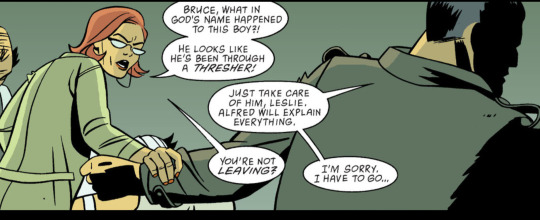
Robin: Year One #3
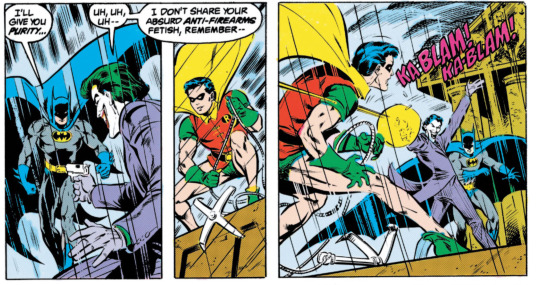
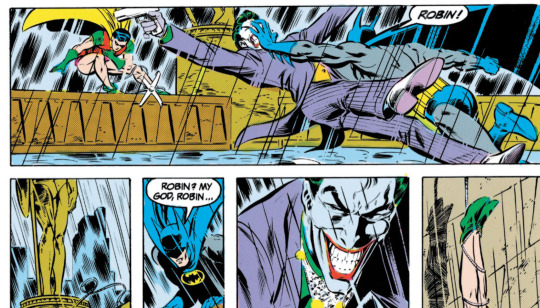
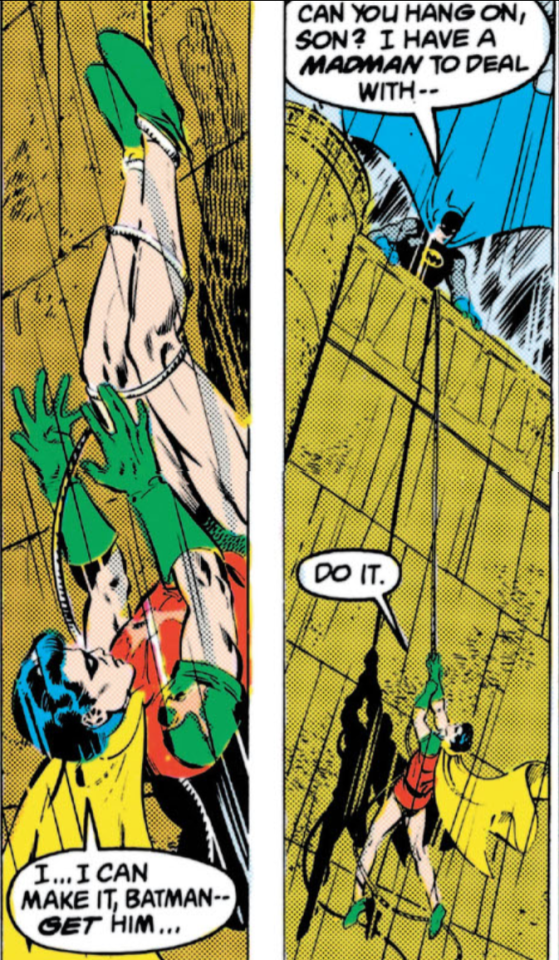
Batmatn #408
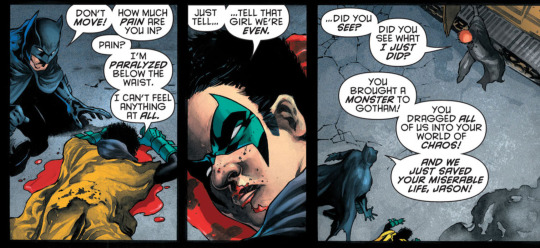
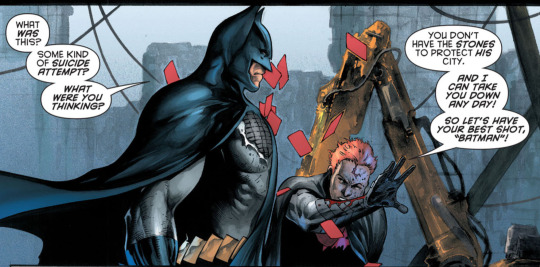
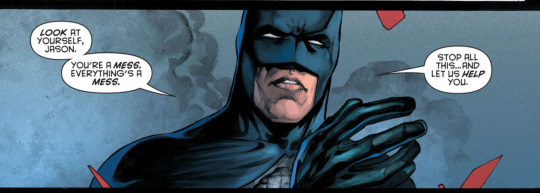
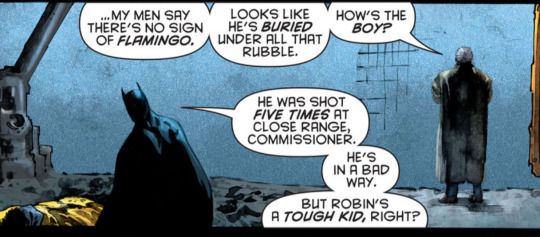
Batman and Robin #6
Dick and Bruce both will deal with whatever current threat exists, before fully helping wounded Robin, getting a verbal "I'm fine" confirmation. They clearly do care about Robin. But they also have an obligation to protect people Bruce tries to physically stop joker. Jason's not fighting Dick, but he is trying to talk him down and talk him into getting help, like he did in Battle for the Cowl. The characters also generally avoid a wounded Robin -- it's just easier to see for Bruce, because Leslie calls Bruce out on it "you're leaving (to go deal with this?)" whereas no one questions Dick leaving Damian once he's got medical care and doing his own mission to revive zombie bruce. I imagine this is partially from guilt (we do see Bruce blaming himself for Dick's close call, and Dick framing Damian as his responsibility in Battle for the Cowl) and also possible due to the whole 'batman has a job, robin's physically OK now so time to help protect people' thing.
A strong difference is after the character's get injured and treated. Bruce becomes overprotective, and continues being emotionally distant, which understandably upsets Dick. He is so overprotective he benches Dick each time he is wounded seriously, and that creates friction between them.
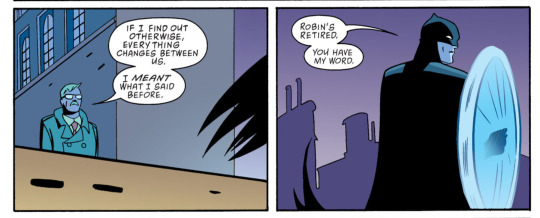
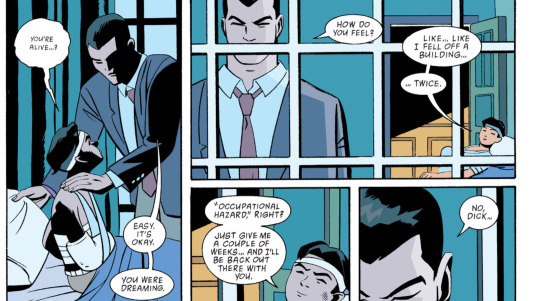
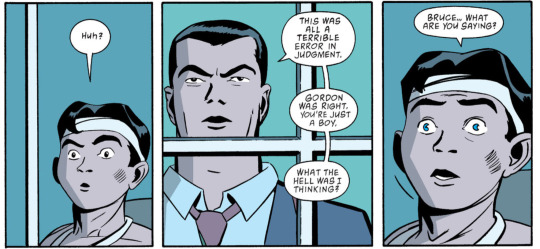
Robin: Year One
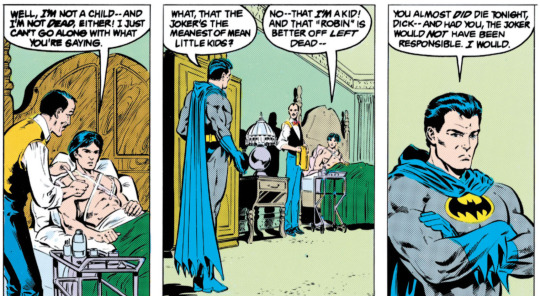
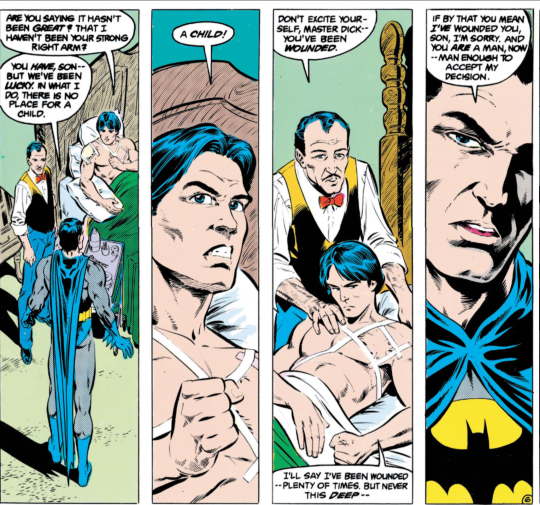
Batman #408
Contrast this to Dick's general lack of protectiveness. Nothing changes when Damian gets wounded as Robin. Which works well (emotionally) for Damian and it works for the conventions of the genre.
Dick is generally not portrayed as very emotionally overprotective when Damian is injured, and when Damian is captured, he often expresses more verbal concern for the people who captured Damian than Damian himself.
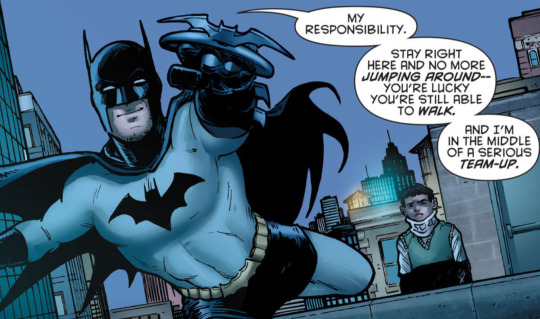
Batman and Robin #9 - Damian, with a new metal spine, got thrown off a building by the zombie batman dick accidentally revived.
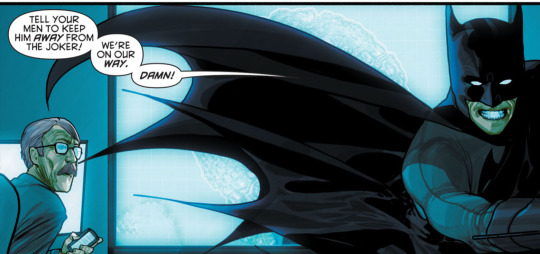
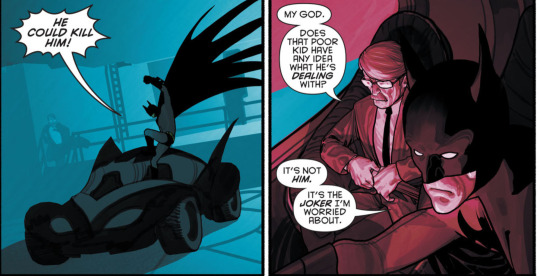
Batman and Robin #13
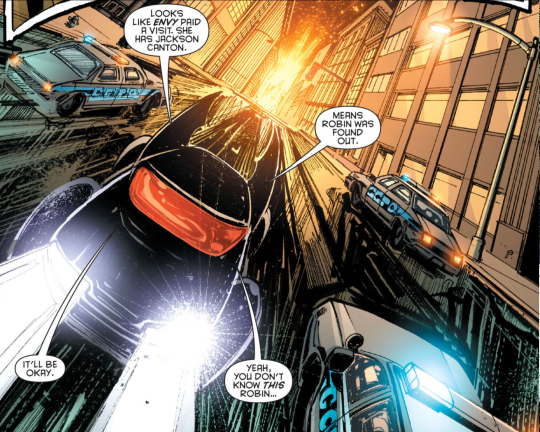
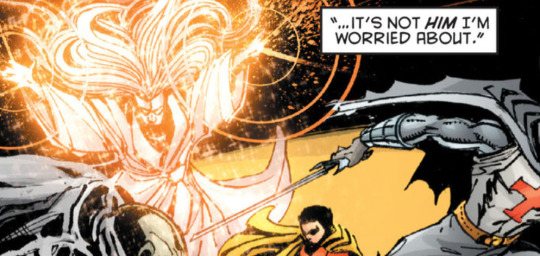
Detective comics annual #11
I should note: I think it would be uncharitable to assume that Dick expressing more verbal concern that Damian will hurt the supervillains who have him kidnapped means Dick doesn't care about Damian. We see in Batman and Robin some of Dick being worried when Damian is shot, and we see Dick telling Azrael they need to find a quicker way to get to Damian when Azrael is talking about how to find the guys who took him. And also, you know. I just don't think Dick would care more about the supervillains that Damian. But Damian is regarded as a tough kid, he'll be fine no matter what, and he represents a threat to other people (interestingly, something I've seen fans accuse... Bruce of doing to damian? Even though Bruce was much more protective and wasn't worried about Damian killing Nobody when Damian was going with Nobody, or Damian killing the Saturn Club guys when Damian let himself by kidnapped by the Saturn club guys to find civilians to rescue)
But I am analyzing here the actions he does and the words that he says, and what the writer dedicates panel time to. I think it's interesting that Bruce and Dick's similarities with regards to Robin getting injured involve emotionally removing themselves from the situation and focusing on cases, and then their differences are in the follow up. Dick often maintains a status quo, which is satisfying to the Robin character (he does not feel like he's being fired or judged) and fits with the conventions of the genre. Bruce often becomes overprotective to a degree where the Robin character feels estranged from him, and is excluded, resulting in alienation from robin and coming across as the "bad guy".
I find it very interesting that Dick avoids repeating mistakes of the past that Bruce made (becoming overprotective of Robin to an alienating degree and firing him) by doing things that would be read as callous or uncaring to the reader if he wasn't Dick, I guess.
P.S. I know some people say this is why they regard Morrison's Dick as OOC, but I didn't have any place to fit that acknowledgement in the above paragraphs, but I think it's important to note that this was not just Morrison's Dick. In general Dick as Batman era was way different than Nightwing Rebirth era Dick or even post 2011 Dick.
#dc comics#2009 era batfam stuff#detective comics 1937#batman and robin 2009#batman and robin#dick grayson#damian wayne#bruce wayne#batman 1940#robin#batman#we were the best#i dont have a bruce and damia interaction tag yet sadly#robin: year one#batfam#character meta
202 notes
·
View notes
Note
What do you think of the Telltale Batman games?
I went into it a bit on this post a while back (spoilers for the ending in the final reblog chain). But in quick summary:
Lots of fun. Well worth buying when it goes on sale.
Really love how much humor Bruce is allowed. His undercover persona as a dirtbag billionaire turning into a crime lord is a lot of fun.
Bruce and Selina get on like a house on fire with all the expected casualties of a house fire in Gotham.
Harley Quinn mob boss: YES YES YES
The game really said, 'BatJokes otp <3333'

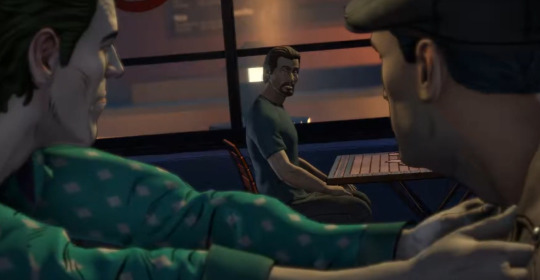
ID: Two screenshots from the Batman: The Enemy Within Telltale game. Both screenshots depict a nighttime background in the city of Gotham. The top image shows the Joker, dressed in a green shirt dragging Batman, who is dressed in civilian clothes as Bruce Wayne, over a table by the collar of his leather jacket as he demands, “Why won’t you love me?!” while Bruce stares wide-eyed at him, lips parted in surprise.
The next image shows both men turning comically to regard a civilian at a nearby table who looks like he wants the floor to swallow him up just so he can get away from what looks like the weirdest public gay break-up going on outside the Gotham equivalent of a Starbucks at 4am.
---
I really enjoy the dialogue options you have as Bruce Wayne vs. Batman and the fact that you can play Bruce as airheaded or cunty as you like. He's either playing Bruce as a spoiled little rich boy or a well-meaning himbo with elevator music playing behind his eyes. There's no in-between.
Alfred is written out of character at the end, and it pulls the whole thing down.
I'd still play a third installment if they made one because I really want to enjoy Tell Tale style games; they just always seem to let me down a bit. But I want to believe...
716 notes
·
View notes
Note
Okay call me crazy but I feel like it isn’t out of the question that Bruce doesn’t know that he (maybe or maybe not, canon is weird) killed Jason at the end of uth? Like yeah he’d probably figure Jason could get himself out of his own mess (rigging the building to blow up) but Bruce was saving the joker at the time.
Idk just the angst of Jason knowing Bruce killed him and Bruce not knowing what he’s done so the literal only person who knows shouldn’t even be alive and yet, here he is.
Anyways! I hope you’re having a good timezone!
Good timezone to you too, Anon!
This is very tasty angst, and I don't think you have to spin canon very far to get there. Selective denial runs deep with Bruce, especially in regards to Jason, and Jason himself is extremely tight lipped about his traumas.
I quite enjoy a scenario where neither of them is sure, but neither of them is gonna be the one to bring it up, yknow?
Bruce tells himself the batarang ricocheting was an accident, that Jason wasn't bleeding that much, that he set the stage for their fight so of course he'd have a getaway plan and nevermind that this was clearly a no-win situation in the first place. On his worst days, he tells himself that it wasn't *his* Jason anyway, that his Jason died in Ethiopia so what does it matter, really.
And then as Jason starts to reform and work with them again, Bruce convinces himself that bringing it up would only make Jason relapse again and it's not worth it because it doesn't matter anyway, Jason is clearly still here so it probably wasn't that bad, Bruce was right to think Jason could get himself out.
Meanwhile Jason is absolutely never breathing a word about how a parental figure chose the joker over him twice, because jesus fucking Christ how embarrassing is that, how broken and unlovable must a guy be to have that happen multiple times.
And maybe sometimes when Bruce gets on his high horse about lethal violence, Jason rubs his thumb over the scar on his neck and bites his tongue real hard, but he's never gonna say it because they both know nobody would believe him over Bruce.
110 notes
·
View notes
Note
I’m rly loving the whole punchline series rn, I find it so interesting like omg Wdym this small child has a more deep and fleshed out background than my oc I’ve had for 4 years??
Anyways- I’ve been thinking ever since I read the a/b/o au of punchline and LW would Damian (and maybe the other bats + Harley) try get Punchline out of that toxic stereotype that Alphas are “better” than omegas and if they do how do they try do that?
-🌻
That's very flattering! I'm playing a lot of Punchline's mannerisms by ear because she's very much not fleshed out, so it's intriguing that it reads otherwise! Fake it till you make it, baby!!!!
Great question! The bats would absolutely try to correct her line of thinking in regards to caste dynamics, both verbally and through example!
Verbally, Alfred and Damian and Tim would put in a lot of work trying to explain that she isn't any higher or lower status to somebody else just because she's an Omega. She has rights and personal agency and bodily autonomy that no one else should be allowed to dictate.
Bruce and Dick wouldn't have this conversation with her on account of being Alphas. She would just defer to whatever they said anyway, regardless of the message they mean to convey.
Jason doesn't have the patience to teach her about Omega rights when they first meet.
By example, Alfred would have her learn lessons through reading books together.
"See, Punchline? The main heroine in this book talked back to her Alpha and didn't face any punishment, because she's allowed to do that as a person with her own thoughts and feelings. Do you have any thoughts and feelings you might be afraid to share because you don't want to get hurt? I can assure you, that won't happen here."
Damian leads by example by Challenging Bruce and Dick more than usual, and makes sure she's watching. It doesn't take long for the others to catch on.
"I said," he'll growl, baring his teeth and taking an aggressive stance "I won't attend that asinine luncheon with you while my brain cells shrivel up and die around all that meaningless chatter your Socialite friends insist upon."
Bruce will narrow his eyes and glare back at him for a few moments, but then he'll relent and his body will slacken, deferring to his son.
"Fine, but you could've stood to be nicer about it."
Dick and Bruce lead by example in gentle ways. Literally. It doesn't take the world's greatest detective to see the scarring on Punchline's body and recognize that the Joker is the definition of Stereotypically-Abusive Alpha. So when they're near her, their voices are soft. They don't stand to their full height. Their hands are open and their scents are passive. If she upsets them, they're careful not to make her think she'll be hurt for it.
It's so, so, so much collaborative work. It's a ridiculous amount of work. Her whole world is being rocked and everything she thought was true is no longer so. She has to accept these changes slowly or she'll block it all out and dismiss it as a trick if they push too hard, too fast.
85 notes
·
View notes
Note
damian is clearly biased in his misinterpretation of jason in boy wonder
damian's interpretation is supported by the story itself; it is clear that you are not meant to take it as a misinterpretation. the hostage narrator (who isn't damian) establishes dick, jason and tim as being nice, angry and reckless, and smart (respectively) in the first issue. nothing is done from then on to either challenge or add depth to any of these.
ignoring both damian and that narrator, even the story itself proves the mindless "nice robin, angry robin, smart robin" categorization. dick's issue even goes so far as to misconstrue his conflict with bruce when he was 18 as being, essentially, "dick wanted bruce to be nicer". jason's status as the reckless robin is reinforced when the comic spells out for the readers that jason (and damian) need batman to supervise them, otherwise they will not think anything through and instead attack like animals. jason's recklessness could not be made clearer by the writer.


this ends with jason hallucinating the joker (surprise, surprise) and then he just starts randomly shooting (which is something he is prone to do when the joker is involved, apparently. under the red hood and lost days, and all of jason's deliberation and planning regarding the joker, must have just been mass hallucinations that all of us had) and damian ends up shot. once again, jason hurts an innocent person because another writer doesn't have the reasoning skills to come up with a logical argument against jason using guns/killing, so they need to create a specific instance (which would be unlikely to happen were he written in character) in order to counteract his entire methodology.
rather than challenging the characterization of jason where anger is most structurally vital to his actions, the story repeatedly defends it. to the point where jason himself brings up the anger instead of anything else. the writer goes a step further and has jason's anger blind him enough to kill the murderers of a victim who did not want jason to avenge him in blood. jason is himself motivated by the perspective of a victim who wants to choose what is done to avenge him, it's senseless to have him ignore the wishes without any internal conflict.

the ending of this issue is literally damian telling jason that jason is the only person standing between himself and reconciliation with bruce. this implication existed in the beginning of the issue as well, with the narrator claiming that jason's gripe with the joker being alive was pointless because the joker's locked up, regardless of the fact that jason first found out joker was still alive when he saw that joker had escaped and hurt people again.

so. there is no misinterpretation. you're supposed to nod along and agree. jason is angry and reckless, and he ends the issue ruminating on the thought that he should made amends with bruce, who has been freed from any responsibility by this point.
#if damian is misinterpreting jason as angry and reckless sure. but why is he thinking of dick and tim respectively as nice and smart?#he doesnt like them either at this point. so what's up with that?#it's because the writer has no interest in questioning these unnuanced labels. literally none.
293 notes
·
View notes
Text
FAE BLOOD DICK GRAYSON IDEA Imagine Dick, unknown to him, descends from a fae's bloodline and is the reason why he seems to be able to do what most regular humans can't; for example, the quadruple flip.
And Dick has enough fae blood in him to curse the robin mantle unknowingly, and that's why those after Dick, who he doesn't give the mantle too, meet such tragedies, even Jason dying.
And the curse is different for each robin depending on how Dick viewed each of them; for example:
With Jason, who Dick viewed as someone who took his spot, someone who dared take his name, the curse of the robin mantle began with him and was the worse. Resulting in Jason's Robin career being unlucky and eventually leading to his demise.
I mean, the Joker didn't kill Jason because he was Jason but because he was Robin.
Tim, the next robin, also suffers a lot on his journey and nearly dies multiple times. But due to Dick viewing Tim as a replacement for Jason and not for him, the curse doesn't kill him.
When Steph came to be robin, she wasn't robin long enough for the curse to affect her; and most of the shit that happened to her happened afterwards with no correlation.
Damien, the robin that Dick gave the mantle to. He doesn't suffer because he's robin. He suffers because he's Damien Al-Ghul. And after he picked Damien, the robin curse nulled.
Who eventually figures it out? None other than Jason. He's always been smart, maybe not as smart as Tim, but he's pretty good at spotting patterns, especially regarding anything Robin-related.
It didn't take a genius to realise a lot of bad shit happens to those who have taken the mantle after Dick due to being robin, all but Damien, the robin he had picked.
So a little bit of digging, It didn't take too long for Jason to figure out the robin mantle was cursed, but he didn't expect Dick; to have been the one to curse it. So he goes to confront the golden boy, Bruce's favourite, at his apartment, and as his fist is about to knock on the door, he is frustratingly stopped by Tim, who had figured this out way before Jason did.
Before Jason punches Tim's lights out, for knowing for so long and not stopping it, he lets Tim speak, and Tim tells him Dick doesn't know, and he isn't sure what will happen if he ever finds out. He's done the research, and it doesn't look good.
Jason doesn't seem to care, so Tim asks him to imagine if he ever found out; their older brother, who has a guilt complex like no other, and is a glutton for punishment, found out that almost every tragedy, even Jason's death was a result of himself, imagine what Dick would do to himself subconsciously and consciously with his abilities.
This stops Jason dead in his tracks. He feels conflicted. He can't forgive what happened, even if it's unintentional, but he doesn't want him to suffer. Uncertain about what to do now, he tells Tim that if this curse affects Damien or any future robins after him, he won't keep his mouth shut.
And then Jason leaves the apartment building, and Tim follows him out; unknown to both of them, Dick was listening from the other side of the door, feeling horrified with himself.
Who knows what he will do now, knowing what he unintentionally has done.
(Can you tell this was my first AU, I'd written, i've slightly edited it so it was readable. LOL)
#Fae Blood Dick grayson#Dick grayson#Dc comics idea#DC Comics prompt#Batman#Batman writing ideas#jason todd#tim drake#damien wayne#batfam#random idea#dc comics
112 notes
·
View notes
Text
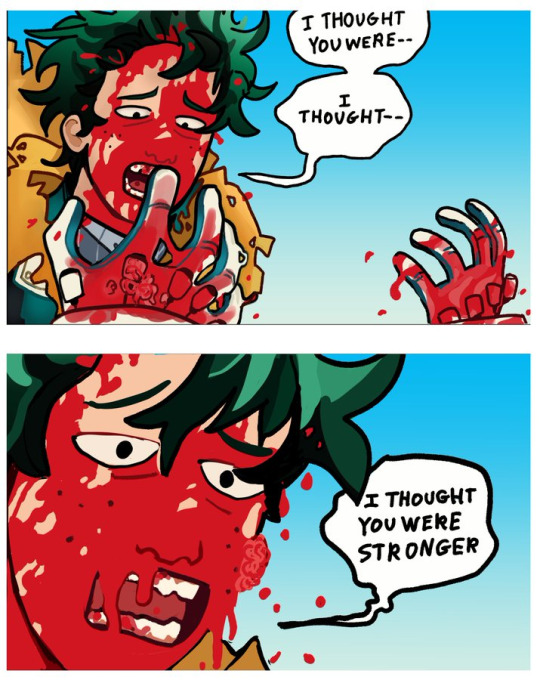
Art credit: @/charscounterattack reposted with permission.
INVINCIBLE VS. MY HERO ACADEMIA: WHEN HEROES KILL
Whether or not heroes should kill people is a hotly debated topic in comics.
There are people who think heroes should never kill, and others who think heroes should kill more. One of the most famous comic book storylines "Under the Red Hood" has Red Hood / Jason Todd debate whether or not it was ethical for Bruce to keep letting the joker live even after the Joker killed Jaso, especially after the Joker killed Jason. If killing the Joker earlier to prevent all future deaths would have been justified. There are like a hundred DC Aus that are like "What if Batman and Superman just started killing people?"
In order to explore this question I'm going to explore two situations in different comics, Invincible and My Hero Academia when the hero, a very idealistic young hero kills someone for the first time.
LET HORI COOK
Storytelling, especially for serialized storytelling which comes out week by week instead of all at once works on the premise of drawing people in by promising that certain future developments and plot points are going to happen. Stories are all about creating expectations, building them, and then paying them off.
Here's an example: The Dabi is a Todoroki theory has existed pretty much since the training camp arc. Horikoshi wasn't in your face about the hints about Toya, but there was just enough hints to make the theory seem more and more plausible. Toya having the same fire quirk as Shoto / Endeavor. Toya mentioning both of them by name. Shoto's two other siblings getting revealed but not Toya. Toya saying that Hawks should have paid attention to him most of all. All of these little pieces came together until Toya finally revealed his identity on live TV in front of both Shoto and Endeavor.
This worked because not only did it give the audience just enough clues that they felt smart for figuring it out, and get invested in the idea of Toya as a Todoroki, it also was well-paced so it didn't seem like Horikoshi forgot about it unlike the traitor plot which went hundreds of chapters without being mentioned. If Toya was revealed to be a Todoroki at the training camp arc with no buildup, it wouldn't be as effective bcause we didn't have years of waiting and theorizing. If Todoroki was revealed to be some guy named Steve after all the hints, it also wouldn't be an effective reveal because there were hints dropped for Toya Todoroki, but there were no Steve hints so it'd feel like the author lied to us.
Themes are like this too. I tend to explain story themes by oversimplifying it as "Question, and answer." The story asks a question, it provides us an answer, and we can come up with our own answer as well. However, there's a middle part I'm skipping out on which is deliberation. Before you can come up with an answer, you obviously need to deliberate it, either by presenting arguments for or against, hearing outside opinions or just thinking things through.
In other words, you need to "Let things cook."
If Toya calling Shoto by his full name at the Training Camp Arc is when we're first asked "Is Toya a Todoroki?" or when the theories first started, then the long middle period between Training Camp Arc and the First War Arc is the deliberation. This is when the story not only added more hints to the idea that Toya was a Todoroki, but also set up why that reveal mattered. Endeavor wanted to atone for his past sins, but one of his victims was no longer alive. Endeavor begins to move on anyway and think he's finally made himself a good hero, but now Toya appears to flip up the reverse Uno Card.
So let's follow this basic formula, for how ideas get developed in My Hero Academia and just any good story.
Question / Introduction
Deliberation
Answer / Conclusion
My Hero Academia and Invincible explore similar themes in regards to heroism, generational trauma and how to be better than the previous generation in both Mark and Deku. I'm going to streamline their arcs down to one basic question for the sake of time. For both the question is:
Can I be a better hero than my Dad?
Deku and Mark might be two characters who cannot possibly seem to be more different, but you can actually list off a lot of similarities between them right away. Deku and Mark are both people who in a world oversaturated with superheroes spent most of their childhoods with no superpowers at all. Also, they were genetically supposed to inherit a quirk / viltrumite powers, but Deku was born quirkless, and Mark was an extremely late bloomer. They are also people who while being powerless civilians for most of their lives worship heroes. Deku collects so much All Might Merch he even stole some from Nighteye after he died, Mark attends comic conventions even after he becomes a superhero.
They also grew up worshipping one hero in particular who was essentially earth's strongest hero, for Mark it was his dad Omni-Man, for Deku it was All Might. They also both get the opportunity to train directly under their favorite hero immediately after they get their powers. At first this makes it seem like they've been given everything they've ever wanted. All Mark has ever wanted was to be a hero like his dad and make his father proud. Not only did Deku just want one person to tell him he could be a hero too even without a quirk, but his very idea of heroism is built around seeing All Might always save people with a smile.
However, both of them suddenly hit complication just when it seems like they've been given everything they've ever wanted. They are both confronted with the fact that their heroes are not who they expected them to be. They are overly idealistic heroes who have been dreaming of being heroes since childhood only to be hit with a much greyer reality. To the point where there innocence becomes a flaw in and of itself. The way they've been coddled and protected all of their lives leaves them completely unaware and unable to spot the grey areas in the world, or the people around them.
For Deku the moral greys exist in the villains around them. In MHA Society, villains are basically just bad guys in suits for the heroes to punch on television. They're seen as a faceless enemy, and there's very little in way of rehabilitation for villains once they're captured. Deku lived in a very black and white world before this point, and he's suddenly presented with the idea that his villains could be morally grey.
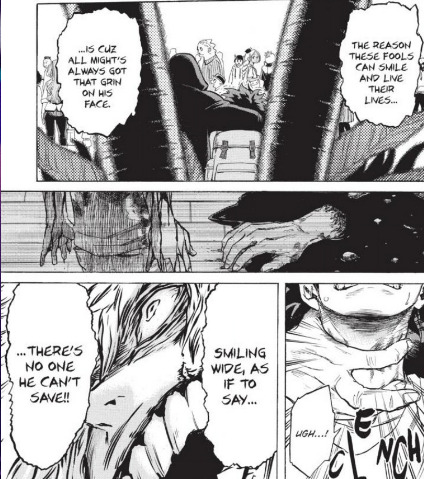
Deku's image of All Might is a hero who saves everyone with a smile, so he could never imagine that there are people who All Might has failed to save. He's never stopped to consider where villains came from, or if any of them might have legitimate reasons for their grievances.
This becomes a pretty central theme in MHA. It's first brought up here when Shigaraki talks about All Might acting as if there's no one he can't save. Twice brings it up again in his first backstory chapter, that the heroes only save the virtuous ones.
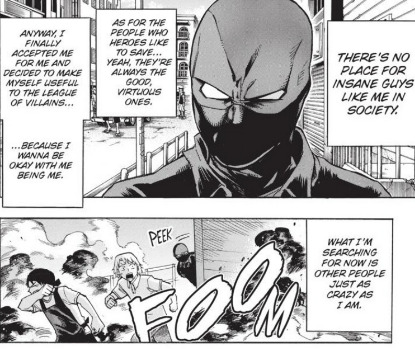
This is further enforced in the same overhaul arc with members who are loyal to Overhaul because they are society's trash who would have been thrown out otherwise. There is a group of people fiercley loyal to Overhaul who is a terrible boss, because he is the only person who would accept them.
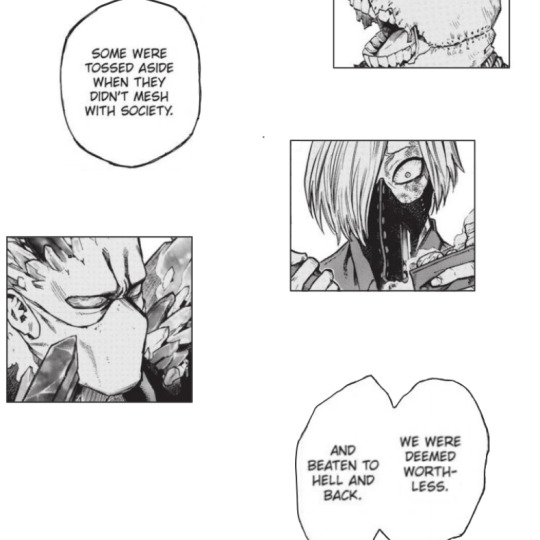
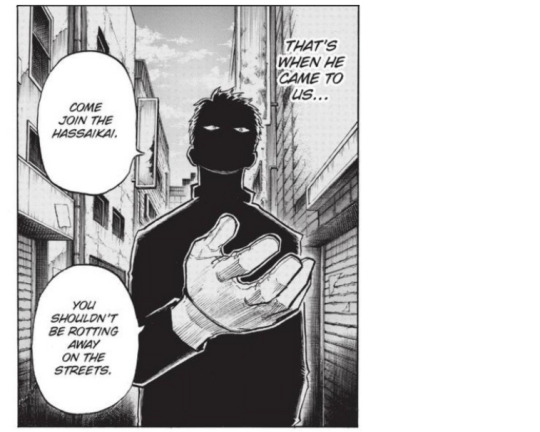
edits belong to @stillness-in-green from bring it all back a tone poem on returning to staus quo located here on ao3.
In the War Arc this long running theme basically reaches a climax with the Hawks and Twice confrontation, where Hawks decides to try to offer Jin a chance to restart because he's deemed him "good" but he won't extend the same helping hand to the league who Hawks has determined as "bad." He then asks Jin to betray his friends in order to be saved, something that Jin rightfully calls out.
That Hawks only wants to save Jin because he's one of the good ones, and he's written off the rest of the league and left them for dead. Hawks choosing to divide between good and bad victims ad only save the one he personally thought was worthy of redemption, makes it impossible for him to save Twice who would never under any circumstances give up on the rest of the league.
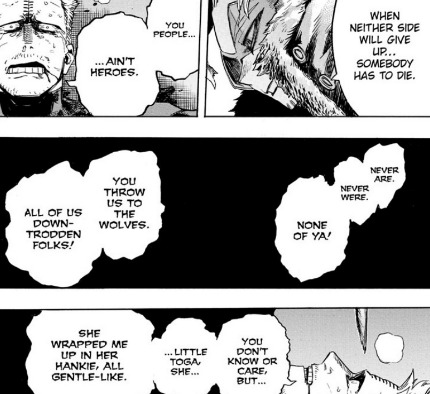
Twice's death is a tragedy, but it also presents us a clear example of the failures of the previous generation. Even a hero who sincerely sympathized with a villain and wanted to help them start over wasn't able to help them because of this attitude of selectively picking and choosing who to save. If the heroes only save the innocent the I guess the lives of the guilty are worth less.
This is the questio Toga poses to Ochako, if the heroes killed Twice then are you going to kill me in order to stop me. This is the central subject of Shigaraki's speech to the heroes. That heroes and villains will never uderstand each other, because the entire hero system perpetuates itself on ignoring the needs of societal outcasts and rejects in form of the "innocent people" and those outcasts who aren't having their needs met eventually turn into villains who get systematically put down by heroes. Heroes and villains are incapable of understanding each other and breaking the cycle, because the entire system isn't built on helping people, but merely maintaining the idea that heroes are perfect, faultless saviors so normal people will feel secure, while the people the heroes have failed get swept under the rug so society can keep "functioning."
"You heroes hurt your own families just to help strangers. You heroes pretend to be society's guardians. For generations, you pretended not to see those you couldn't protect. That means your system's all rotten from the inside with maggots crawling out. It all builds up, little by little, over time. You've got the common trash, all too dependent on being protected, and the brave guardians who created the trash that needed coddling. It's a corrupt, vicious, cycle. Everythig I've witnessed, the whole system you've built has always rejected me. Now I'm ready to reject it. That's why I destroy. That's why I took power for myself. Simple enough, Yeah? I don't care if you don't understand. That's what makes us heroes and villains."
So if the starting question is: Can I be a better hero than my dad?
Then everything I've detailed above is deliberation. Here we have, ever since the training camp arc, this slowly built up idea of why All Might was a flawed hero in the end.
Mark has to face the fact that his father is a more morally grey person than he could ever imagine, whereas Deku has to face the fact that the villains are more morally grey in his world, and that makes the heroes look more flawed in comparison as well. The deliberation is all slowly bringing Deku to think over what Shigaraki asked him all the way in the beginning in there first meeting.
Were there ever people that the heroes couldn't save? If so then what are you supposed to do with the victims you can't save after they grow up? This is when Deku begins to start forming his own answer.
Deku hears the advice of both the other OFA users, and The Stinky Old Man (Gran Torino) that killing Shigaraki is the best option, but wants to explore other options.
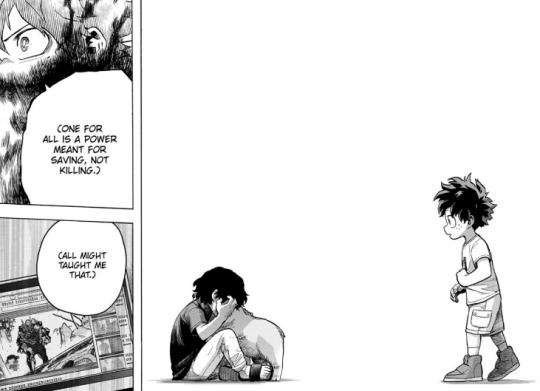
Scenes like this clearly telegraph what the answer / conclusion Hori is leading us to to be. The same way that Toya is a Todoroki is foreshadowed long in advance, statements like "All for one is a power meant for saving, not killing" clearly set up Deku's Endgame. Deku's end goal is to find a way use his power to save Shigaraki rather than killing him. Everything else is just a matter of deliberation, Deku knows what his edgoal is but the chapters between then and the end of the manga is Deku having to figure out how exactly to save Shigaraki without killing him.
You Heroes Hurt Your Own Families Just to Help Strangers
Invincible is the story of Mark Grayson, the son of Omni Man / Nolan Grayson. He's been told all of his life that his father is a viltrumite, a race of benevolent aliens who send out people like Nolan to alien civilizations in order to uplift their entire civilization. Which is what led Nolan to come to earth and become Earth's greatest heroes.
This turns out to be a big fat lie when within 12 chapters Nolan not only slaughters the guardian's of the globe, but also has a confrontation with his son.
Mark has wanted to be just like his dad his entire life. Only to be slapped in the face with the realization he's known nothing about his dad his entire life, shown rather brilliantly by these panels where Nolan tries to have a normal father / son conversation with Mark while covered in blood.
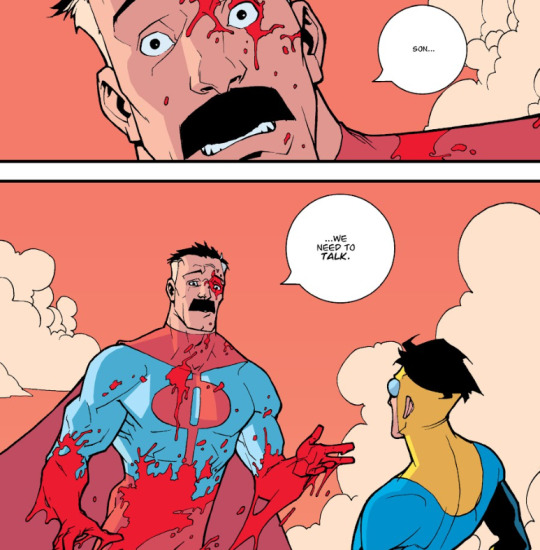
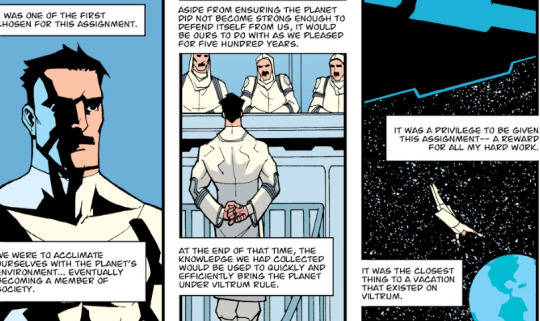
Nolan isn't from a futuristic utopia but from a brutal, fascist space empire. He didn't come to earth to help bring it up, but to weaken its defenses and make it prime for conquering. He didn't have Mark out of love, but to produce another soldier for the viltrumite empire.
Mark's entire schtick is that he's invincible, but he's so inexperienced as a hero that he gets beat up constantly despite the fact he has the strongest power set in the series b/c he has viltrumite powers. However, not only does the series introduce moral greys by continually showing how Mark even with the best power set in the series constantly gets his ass kicked, it also challenges Mark's black and white thinking and hero worship of his father by showing him the kind of man his father really is.
Mark has wanted to be exactly like his father his entire life, but now that's suddenly a bad thing. His father is a morally reprehensible person and Mark is now a descendant of an alien race meant to conquer worlds. Not only is Mark confronted by who his father really is, but now everyone in Mark's life judges him by comparing him with his father.
Mark has to work with Cecil and be his on-call Superhero, both to be able to pay for college, and also to prove that he's not his dad. The unspoken part of the agreement is that Cecil gets to keep a leash on Mark and Mark has to prove that he'll never turn out like his father to earn Cecil's trust.
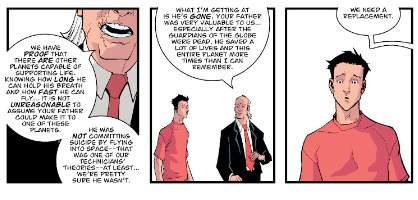
Cecil is automatically suspicious of him because if Mark were to turn evil, the planet would have no defenses against him just like it didn't have any for Omni Man. Mark's mother starts to drink and blames Mark for Omni-Man leaving in a drunken moment of weakness because of how much the information that Omni Man only regarded her as a pet affected her.
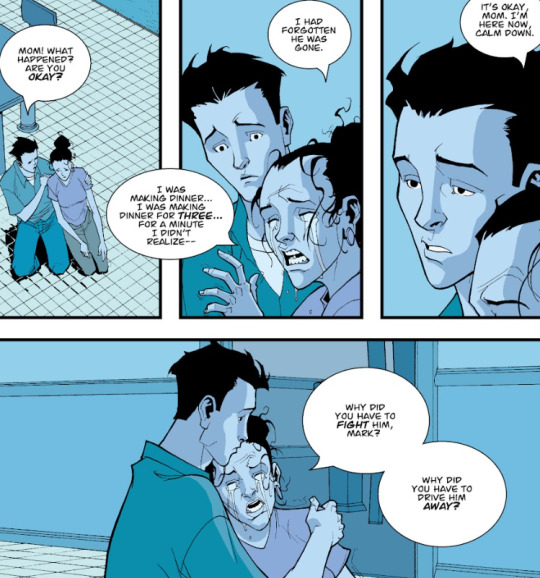
The comic even shows us that in most alternate universes, mark actually did make the decision to join his father's conquest, and this universe is one of the few exceptions. This is also where we're introduced to a major reoccuring antagonist in the comics, and also the main antagonist / final antagonist of season 2 of the cartoon Angstrom Levy.
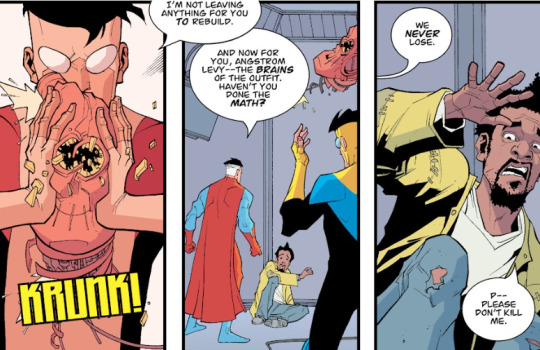
Levy is someone who can jump between dimensions and has traveled to almost all of them collecting his alternate selves. He has witnessed for a fact that in most universes Mark sides with his father instead of fighting against him.
Levy enlists the clone bros to build a device that would combine the knowledge of his alternate selves into one individual. This device ends up breaking tragically (partially mark's fault, but levy himself made the decision to stop the machine in order to stop the clone bros from killing Mark). Levy's memories become confused as a result of the machine malfunctioning, and he can't tell the difference between himself and his alternate universe counterparts. This means that Levy now remembers several alternate universes where Mark did turn evil, and remembers them as if they happened to him.
It's better elaborated upon in this post:
The process by which Invincible has had to condense and consolidate the plot beats of the original comic, coupled with the opportunity it's granted the writers to tighten up and emphasize its themes on a second pass, has resulted in a newfound appreciation for how unbelievably fucking good Angstrom Levy's whole character concept is. What's that, Mark? Your main emotional crisis this season is your fear of turning out like your father? Here, have an archnemesis who's out to kill you because his memories were inadvertently overwritten with the lived experiences of hundreds of alternate versions of himself whose friends and families were slaughtered in worlds where you did, in fact, turn out exactly like your father. Because it turns out that that is in fact the multiversal norm. That you turn out like your father. And now you're left to wonder what set of arbitrary coinflips pulled you back from that abyss in this dimension, and whether your luck is going to continue to hold into the future.
Mark is not only hit with the revelation that his father isn't as good as he thought he was, but also while he's in a crisis about about whether or not he will turn out like his father, he learns the answer is yes, in several dimensions he turns out exactly like his father.
In My Hero Academia there are families like the Todoroki's who balance the difference between a hero's obligations to society, and a hero's obligation to society. However, that's a side plot where I'd argue that the main plot for Invincible and it's main focus is what Mark owes to the world as a hero, and what Mark owes to his family.
It's not just that Omniman is trying to invade earth for the Viltrumite empire. It's not just that he failed as a hero, but that he failed as a father. What makes Mark snap, is hearing Omniman call Debbie a pet. Until that point Mark was in denial and still trying to reason with his father.
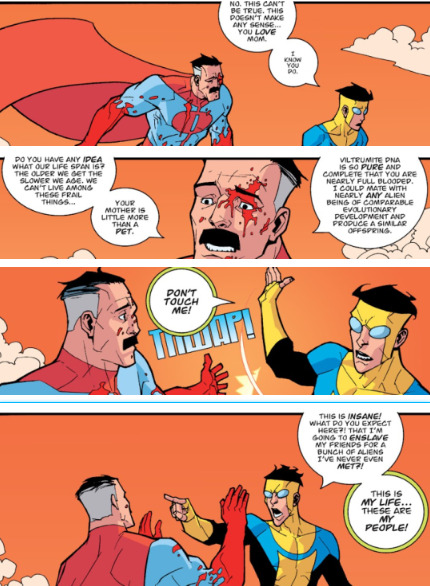
Invincible is about two intersecting themes: Is Mark obligated to use his incredible powers to help make the world better? Can Mark be a good hero and a good family man?
While MHA has more far reaching societal implications in its themes and questions, Invincible is more specifically about the Grayson Family. It's generational trauma on a society level, vs generational trauma on an individual level. The way Nolan was raised on Viltrumite effects how he raised Mark causing their conflict, and Mark's conflict with his father effects most of his young adulthood when he's trying to figure out what person he wants to be (read: not his dad), but also the way he parents his daughter with Atom Eve.
Omni-man failed Mark as both a hero, and a father. Mark feels the need to overcompensate for what his father did the world and all those innocent people by acting as Cecil's lapdog and doing whatever Cecil tells him.
However, Mark is much more hurt by the personal betrayal than he lets on. It's not just that his father killed a bunch of innocent people, it's also that Mark's father failed as a father, abandoning both him and mom and choosing to be a viltrumite rather than being Mark's father. Mark's stated reason for wanting to be a hero post the omni-man reveal is to prove he's not like his dad to the world, and also make up for the innocent lives he failed to save. However, his unstated underlying reason is Mark is hurt and betrayed his father didn't put his family first, and this causes Mark to always put his family first.
This leads to two insecurities / narrative flaws. One, Mark is insecure about becoming like his father so he tries to prove he's nothing like him by being the most selfless, perfect hero possible. Two, Mark is hurt by being abandoned by his father and doesn't want to become a deadbeat like Nolan so he gets extremely overprotective of his own family.
These two things are obvious in conflict with one another: A hero has an obligation to the common good which sometimes means sacrificing time with your loved ones. However, being a good family man requires a level of selfishness that directly contradicts the selfless hero that Mark is pushing himself to be. In the comic the way Mark prioritizes his family and loved ones over the common good and justice is made even more obvious. His first instinct on seeing Omni-Man again isn't to call him out for being an awful father, but to hug him and ask him to come home. Mark is a distraught son first, and a hero second.
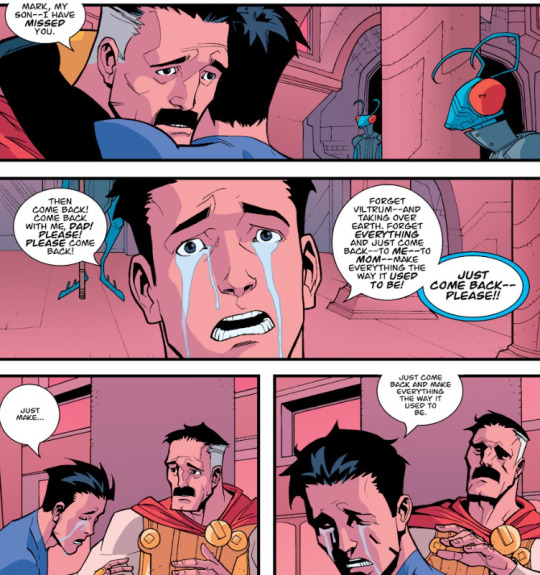
Mark has two flaws, his fear of being like his father makes him try too hard to be a perfect hero, and his trauma over losing his father makes him prioritize his family over being a hero. It's very much a having your cake and eating it too situation, oftentimes heroes make huge sacrifices for their personal lives in order to be heroes, that's basically a theme discussed in the comic with Nolan being absent for a lot of Mark's childhood, and why Mark's relationship with Amber fails.
The show also introduces us to the idea that Mark is so afraid of becoming like his father that he deliberately holds back his punches. Which is good when he's fighting earth villains, but bad when he's facing viltrumites who can only survive being disemboweled, but will also come to wipe out all life on earth if they're allowed to live. In the show it's directly mentioned that Mark is holding back, in the comic it's implied when we see how helpless Mark is in the fight against other viltrumites. Mark lacks the resolve to kill someone and when fighting a viltrumite, failing to put them down can have consequences because they are galactic conquerors who will not show you any mercy.
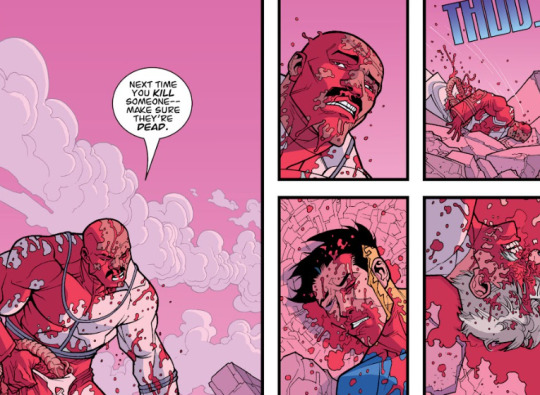
This all comes to a head in the Angstrom Levy fight where Mark makes his first kill on-screen when beforehand he'd never fought to kill before, and even held back against galaxy conquering aliens who were out to murder him and his dad.
However. before we begin that.
Should superheroes kill?
People often act like whether or not super heroes should kill their villains is a black and white topic, where it actually depends highly on context.
Batman’s an entire character is written around how he wants to redeem Gotham and save the city, most of his villains aren’t even sent to prison they’re sent to Arkham a facility that’s supposed to rehabilitee the mentally ill so they can rejoin society. Batman has decided it’s his place to stop crime, not his place to decide whether or not people have the right to live or redeem themselves.
Batman is also at risk for being just like his villains, that’s why he’s foils with Harvey Dent, someone who tried to prosecute people under the law who then snapped and went full violent mobster vigilante. Batman actually is at risk for walking the same path as Harvey if he decides murder is an option.
In X-Men 97, there was a character known as Rogue who dropped Simon Bolivar Trask off of a building in an act of vigilante justice. This action makes sense in context for several reasons. One Rogue was raised by Mystique and Destiny, is a former member of the Brotherhood of Evil Mutants, and began as a terrorist in the comics. She's not really a "moral highground" character like Batman. Two, Boliver Trask built a giant killer robot that resulted in the deaths of millions in Genosha which Rogue is a survivor of. Number three, Trask had no sympathetic reasons for building the genocide robot, he built the sentinels out of bigotry to wipe out mutants. He's not a victim in any way, he's an oppressor facing consequences for his actions.
Batman shooting Harvey Dent, his former best friend, a victim of severe mental illness and trauma that still has hope for recovery, and Rogue dropping the guy who made a genocide robot off of a building are both wildly different situations.
So in the context of MHA we have Shigaraki Tomura, a terrorist who's goal is to destroy japan enough that it will dismantle the hero system for good. Shigaraki Tomura is a ten year old child who lost control of his quirk and killed his family for mistake, he wandered for days in crowded city streets but not a single hero stopped to help him, then he was found by the main villain of the story and groomed for ten years into becoming his successor. Shigaraki is also surrounded by a group of societal outcasts who were failed by society in similiar ways, so Shigaraki knows he wasn't the only one failed by hero society and he starts to wage his war for their sake as much as his own.
In Invincible we have Angstrom Levy. Angstrom is not plotting mass murder the way that Shigaraki is. He is specifically only targetting Mark Grayson's family for revenge (at least the first time he showed up, the second time during the invincible war arc was different). Angstrom's revenge against Mark Grayson is misplaced, but to be fair the accident messed with his brain hardcore and he doesn't remember clearly what happened. He doesn't remember that he's the one who decided to stop the machine in order to help Mark. It's tragic. Angstrom also has the memories of like hundreds of different universes of evil Marks. Even though he's the victim of a tragic accident, he's also a victimizer in that he doesn't choose to just go after Mark, he deliberately picks Mark's family, his mother, and his infant little brother as a way of hurting Mark.
So both of these characters blur the line between villain and victim, but neither of them are like Trask in that they have no sympathetic motivation whatsoever. Shigaraki's actions don't come from bigotry, and he's not an oppressor. Trask was actually trying to do something good before his machine broke and his brains got scrambled, and now he wants personal revenge and to blame all his problems on Mark which is petty yes, but not on Trask's level of heartlessness.
So, there's a case that can be made here for both of them that there's room to save them. After all Mark and Deku aren't killers to begin with. Mark especially has an incredibly vested interest in not becoming a killer. Even if they don't explicitly go out of their way to save and redeem these two people, we're still at this point expecting the heroes to at least take down these two sympathetic figures non-lethally. Mark doesn't want to be like his dad and Deku has said explicitly he wants to save Shigaraki, and that OFA is a power for saving and not killing.
Also to sidestep this argument before people comment on my post with it.
What do you expect the heroes to just let a mass murderer live?
YES!
It happens in comics literally all the time.
Magneto, Wolverine, Jean Grey / Phoenix, Emma Scott, heck, OMNIMAN himself, all characters who have killed lots of people and all characters who get to live and even be on the heroes side. Of these three Jean Grey of all people has the highest body count.
Shonen Jump also has Vegeta. Have you ever heard of Vegeta? Most popular Shonen Rival of all time? Omni-man and Viltrumites are basically just Saiyans.
In real life they wouldn't let a mass murderer walk away but comics are not the same as real life. That's why characters are always punching dinosaurs all the time. Fun fact, if you were to try to punch a dinosaur in real life it would probably hurt your hand. I would advise against it. Dinosaurs are for the most part much stronger than human beings.
As I outlined above Shigaraki and Angstrom are different characters than Trask. They might all be murderers, but the first two have sympathetic elements and are humanized, they are victims of oppression (Angstrom's been killed by viltrumites in a whole bunch of worlds) whereas Trask is an oppressor.
So for both of these stories we are not expecting to see Deku and Mark kill their final villains (for the series and for this season). Deku because he's spent the final third of the series trying to work out a way to save the villains, and Mark because he doesn't want to turn out to be a violent murderer like his father so he's trying to be the most selfless, most perfect hero ever.
I THOUGHT YOU WERE STRONGER
So we finally reach the scenes in question and I thought I'd compare them without much commentary, just highlighting what happens without adding much spin.
So the final episode of Invincible Season 2 and Issue #33 of the comic is where Angstrom and Mark have it out. Angstrom appears in Mark's home and threatens his family. he brings up the comparison between Mark and his father right away. This is also something Angstrom has seen first hand by traveling to multiple universes where Mark has sided with his father.
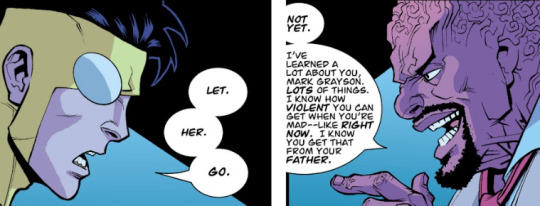
In the cartoon he's a lot more confused because he's constantly remembering other universe's memories as if he were his own so he genuinely thinks he's taking down an evil viltrumite, in the comic he's being more petty and blaming Mark for his deformity (I think he doesn't remember that he was the one to take the helmet off by choice). In both versions he uses Mark's family as hostages to keep him from fighting back as he tries to send Markk to his death in several different realities.
Angstrom then ups the threat of violence from holding them hostage to threatening to kill them. In both the show and comic he brutally breaks Debbie's arm. Mark is sent through several more realities, only to discover that Debbie's arm is broken and lose his temper.
Mark and Angstrom's fist fight comes to an end, and while Mark has him on the ground he keeps hitting and hitting and hitting long after Angstrom stopped fighting back. Which is what prompts the famous "I thought you were stronger..."
Now, in this situation it looks pretty justifiable that Mark attacked Angstrom so aggressively,. it was self defense for one against a man trying to kill him and he only got truly aggressive after he saw his mother's arm get broken. Not only that he didn't intentionally kill Angstrom, you can argue he went too far in a case of clear self defense. Other people even tell Mark that this one isn't on him, including Cecil who compares Mark to his father the most.
Then, why is Mark so disturbed?
It's because this....
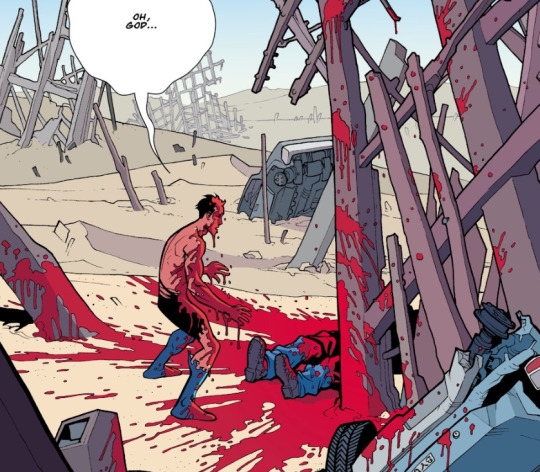
Is a deliberate parallel to this...
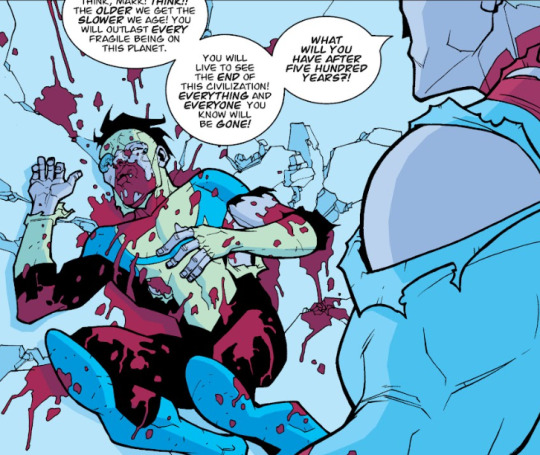
It's not just that Mark killed a man, it's that he killed a man by pounding on him relentlessly long after he'd stopped fighting back the exact same way his father did to him during their fight.
There's a difference between Mark say, fighting against a viltrumite and making a deliberate decision to kill them because of the danger that viltrumites represent to other people considering they are planet conquerors, and Mark killing this man because he lost his temper and couldn't control his own strength.
Mark spends the entire season trying to not be like his father, only to see first hand that he's capable of the exact same violence that his father is. The last episode of Season 2 summarizes this moment pretty perfectly in a montage of season 1 moments while Mark screams and breaks the sound barrier trying to push his viltrumite powers to their limits.
Mark: I'm strong enough and I can do this. It's all I've ever wanted for as long as I can remember. I want to do what you do. I want to be just like you. Omni-Man: You will be, son. You will. Mark screaming. Omni-Man: You'll outlast every single fragile being on this planet. You'll live to see this world crumble to dust and blow away. Everyone and everything you know will be gone. Mark screaming. Cecil: You know who else said that to me? Mark: I'm not my dad. Mark screaming some more. KRegg: Your father will be execute and you can return to earth. You will assume the mission to prepare earth for our rule.
So not only is Mark hit with the realization that he's just as capable of being violent and angry as his father is. He also is being forced by the situation to become more violent out of pragmatism, because if he doesn't get strong enough to fight viltrumites then they're going to come to his planet and take everything.
Not only has Mark lost some of his innocence, he's also being forced to throw the rest of it away. It's why Mark drops out of college at the end of the season because any pretense of balancing between his human life and his duty as a hero is gone. He is basically forced to be a viltrumite full time now and will abandon any semblance of trying to live his own life for a very, very long time until his relationship with Eve starts to get serious.
Which is why a pretty justifiable murder in this context is presented as so bloody, gruesome and traumatizing an event for both the audience and Mark himself. We both know there's no coming back from this.
As for the death of main series villain Shigaraki Tomura, Deku ends up being forced to kill Shigaraki in a situation similiar to Mark. Though I will highlight one difference right away. Mark was trying to reason with Angstrom, but he was at no point like "I want to save Angstrom, he's a victim I want to find some other way of ending this bloody conflict between us." Mark just didn't intend to go so far as killing him.
Deku entered the fight with the explicit stated desire to save Shigaraki rather than killing him, which would make him different from the previous generation of heroes because he wouldn't turn a blind eye to society's faults and victims like Shigaraki accused him of.
Deku makes a journey into Shigaraki's mental landscape to find Tenko in a recreation of the memory of the day of his worst trauma. As Tenko's quirk activates, Deku attempts to grab the little boy's hands to comfort him.
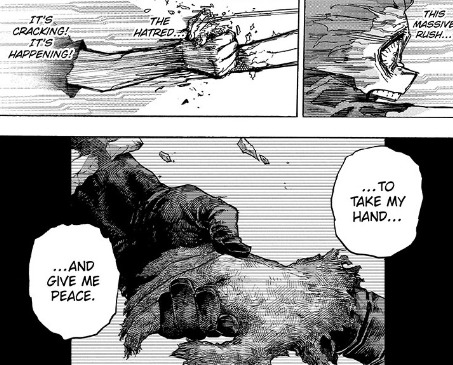
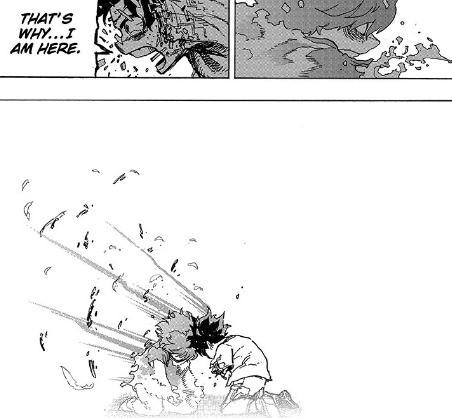
Deku's "Why I am here" is markedly different from All Might's. Deku says the reason he wants to save others is to take their hands, comfort them and give them peace, whereas All Might as the strongest hero tried to keep peace by beating all the villains down. Deku's way to become the greatest hero once again, focuses heavily on saving others, and offering his hand to everyone without hesitation instead of picking and choosing who to save like previous generations.
Deku even says that he has to extend a helping hand to everyone because he's learning that the world is more complicated than he thought, he was ignorant to a lot of people's suffering, and he can't sweep their pain under the rug anymore.
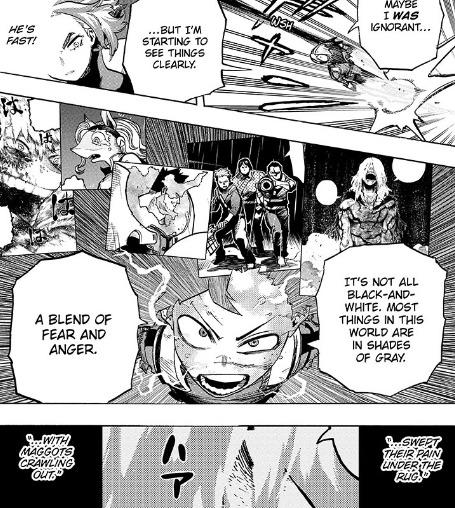
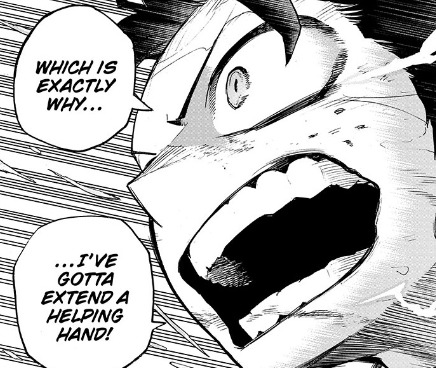
For a moment Deku unconditionally extending a hand to Shimura Tenko even as his mental body begins to decay away wins over Shimura Tenko. Though Shigaraki also resists because much like Twice he doesn't want to abandon the rest of his friends even if it means he personally will be saved.
However, any attempts to save Shigaraki are interrupted by AFO suddenly appearing out of nowhere and taking control of Shigaraki's body yet again.
At this point Deku does exactly what Mark does, which is relentlessly punch Shigaraki's body to death in order to kill AFO along with Shigaraki. In some small defese Shigaraki was also there too punching AFO in his mental landscape so he was assisting Deku in defeating AFO he wasn't helpless the entire time.
But, basically we see the same scene happen with Mark.
A hero who does not wish to kill is forced by circumstance to kill a villain. In Deku's case it should be even more devastating because they explicitly went into the fight wanting to save Shigaraki and they believed their power was for saving and not killing.
Yet, we don't get nearly as horrified a response from Deku.
However, instead Deku's final words are just about how he couldn't forgive Shigaraki and had to put a stop to him no matter what.
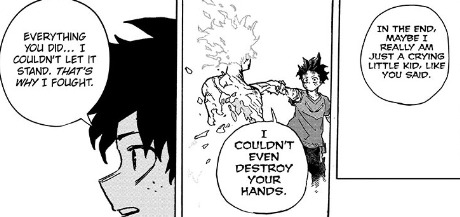

Even the way the scenes are presented to us are entirely different. Mark punches Angstrom in a wasteland a dry, dead place, until he's soaked in Angstrom's blood, and painted everything around him red. Once again, it's a visual callback to Mark's father beating him half to death, which was Mark's own lowest point.
Whereas, when Deku punches Shigaraki until he disintegrates not only is the violence or horror of Shigaraki's death not acknowledged, but it's played as a triumphant moment where the clouds clear from the sky and the stun starts shining.
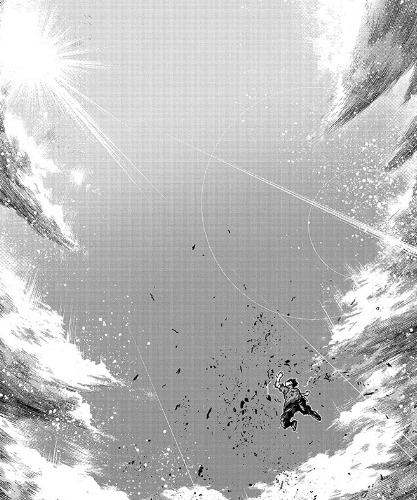
In the cartoon Mark killing Angstrom leads to a total screaming breakdown where he has traumatic flashbacks of his dad beating him and pushes himself to break the sound barrier multiple times. It also leads him to making big life changes like dropping out of college to become a hero full time and giving up any pretense of having a normal life. As seen in a scene where he watches Amber from the sky, and is tempted to go down and greet her and just flies off, because Amber represents his connection to his humanity.
Also, Angstrom doesn't even die. He comes back way worse and that's how invinicble war arc starts.
In the aftermath of killing Shigaraki, Deku gets melancholy about not being able to save Shigaraki only to be reassured he did save him in the end. Only to be told by All Might that it's okay because he still saved Shigaraki's heart even if he killed him.
DEKU: "I couldn't save Tenko's life." "I reached out to his heart, and even though his hatred was crushed," "to the very end, Tenko" "was the leader of the League of Villains." ALL MIGHT: "Let me tell you this as someone who has had a near-death experience," "I think it's in the expression on his face at the end." "If there wasn't a crying boy there," "I think his heart was saved after all,"
People also try to convince mark that he did nothing wrong and that there was no helping what he did in a situation like that, but he doesn't let himself believe them.
The ending lines about the last episode of Season 2, are this:
Eve: I'm sorry Mark. It's not fair. You don't deserve this. Eve: You don't deserve this.
Which has a double meaning. Eve is just trying to comfort Mark, because arguably he shouldn't have to feel guilty for fighting in self defense. On the other hand what Mark hears is You don't deserve this in the context of Eve's feelings for him. An alternate timeline version of Eve confessed her love for Mark. Mark was about to bring it up but decided not to. At that moment as Eve embraces and comforts him, what Mark hears because of his own self loathing is that he doesn't deserve Eve comforting him, or her love for him.
Just to clarify I don't think that Mark is crying over Angstrom Levy specifically. In fact over time he's painted to be pathetic in his obsession with revenge, and what he amounts to is just wanting to blame everything on invincible when it was partially caused by his own actions.
However, it's inarguable that killing (or rather seemingly killing Angstrom) deeply impacted Mark and how he saw himself as a hero. It's less about Angstrom, and more about the loss of control, and the realization of how powerful his anger and hatred can get and what that means for him personally.
It also shows us where Mark's priorities lie. Mark wants to be a perfect hero and a perfect family man, and Invincible shows us he can't be both, his desire to protect his family leads him to staining his blood when he was trying so hard to be a good, selfless hero. This is all a part of a deliberate arc where Mark chooses more and more to value his family over being a hero. I'm not going to say whether or not it's the right choice, but it's a choice he makes, as a part of his character development where as he grows up and becomes a father his priorities change.
My point is that this moment has an impactful change on Mark, for arguably the rest of the comic.
Now my question is, with My Hero Academia will the death of Shigaraki Tomura, the series greatest villain and it's greatest victim have an equal impact on Deku's character that Levy's death did on Mark's?
#bnha 424#bnha spoilers#invincible#mark grayson#deku#izuku midoriya#mha 424#mha spoilers#omni man#bnha meta#mha meta
352 notes
·
View notes
Text
hey so about jason's death (some of the stuff that happened after)
A continuation of this post, which I recommend reading first. All disclaimers from there apply here as well--we're sticking to post-crisis & maybe i missed stuff.
In related news, here is my death certificate hater-posting.
Better people than me have compiled the victim blaming regarding Jason's death (along with more general commentary about how Bruce reacted emotionally to Jason's death), so I won't really be diving into that here.
I could also talk for, frankly, far too long about how Bruce's monologue at the beginning of #428 is already retconning and rewriting so much of their relationship dynamic and basic facts about what happened, but that's not what we're here for. Another time, perhaps.
Immediate fallout
Bruce finds Sheila first. Sheila says (1) the Joker did all this (2) Jason tried to save Sheila and was a really good kid and must've really loved his mom. At no point does Sheila mention she betrayed Jason.
Bruce finds Jason next. Apparently his corpse is already cold to touch, but Bruce checks the pulse anyway. (This is simply impossible--corpses take a long ass time to cool, but it does indicate that Jason's supposed to been dead for a while, at this point. Namely, that he died in the explosion and NOT to smoke inhalation after the fact I don't CARE what the death certificate sa--*gets shot*)

Batman (1940) #428 pg 14
Bruce covers up the crime. He removes all proof of Robin before calling authorities. We don't know exactly what he told them, besides that (1) he didn't know what caused the explosion, but implies it was an accident (2) he identified the victims by their real names, and called them mother and son.
Bruce flies the bodies back to the states for burial. The Joker has killed all his henchmen, leaving their bodies behind in a different warehouse (in Addis Ababa). He leaves a message on the wall in red paint telling Bruce to meet him at an address back in Gotham.
(This contradicts with later panels from Red Hood: The Lost Days Issue #1, in which the League of Assassins tortures interrogates Joker's henchmen that witnessed Robin's death. The LoA did kill them afterwards, though, so either way they're definitely dead by now.)
Bruce "takes the Joker at his word" and flies home with the two corpses.
The funeral & casket
I use coffin and casket somewhat interchangeably because dc does too, but it is worth noting that these are two different things. It looks like Jason's in a casket.
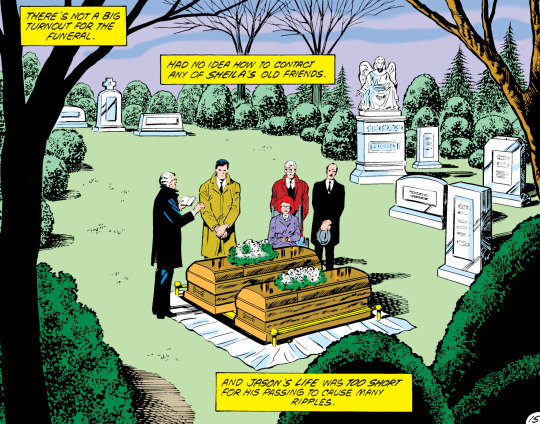
Batman (1940) #428 pg 15
This panel implies that Jason and Sheila were buried next to each other, but Sheila's grave is not mentioned elsewhere ever again.
We get no clear indication how soon the funeral is after Jason's death. Alfred does not ask about contacting Dick until the funeral is already underway.
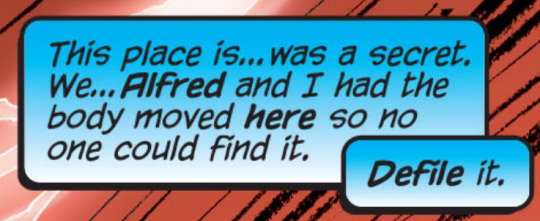
During Hush (Batman (1940) #617), we learn that Jason was buried in this "secret" location. Detective Comics (1937) #790 show that this was in a public cemetery, presumably Gotham Cemetery. The implication of having the body moved in the above panel means Jason may not be buried next to Sheila anymore.
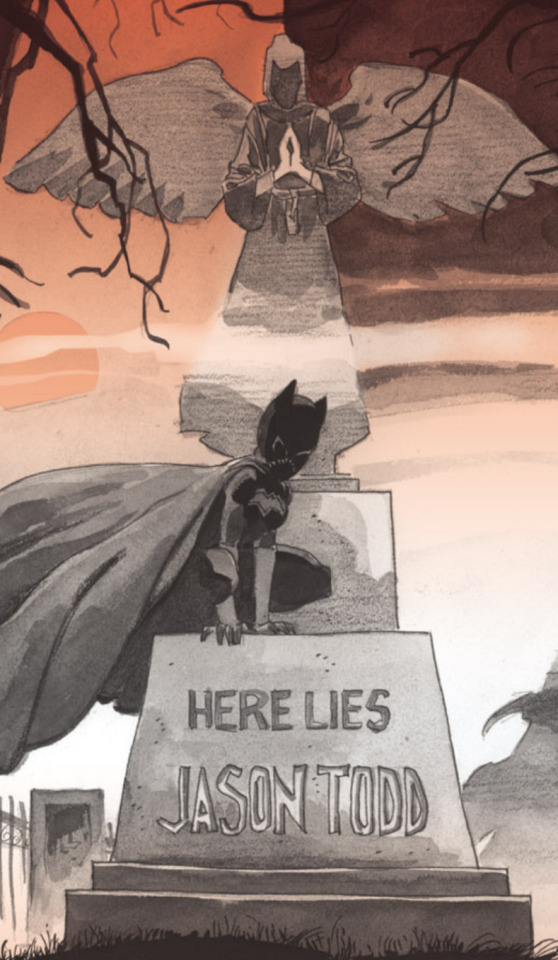
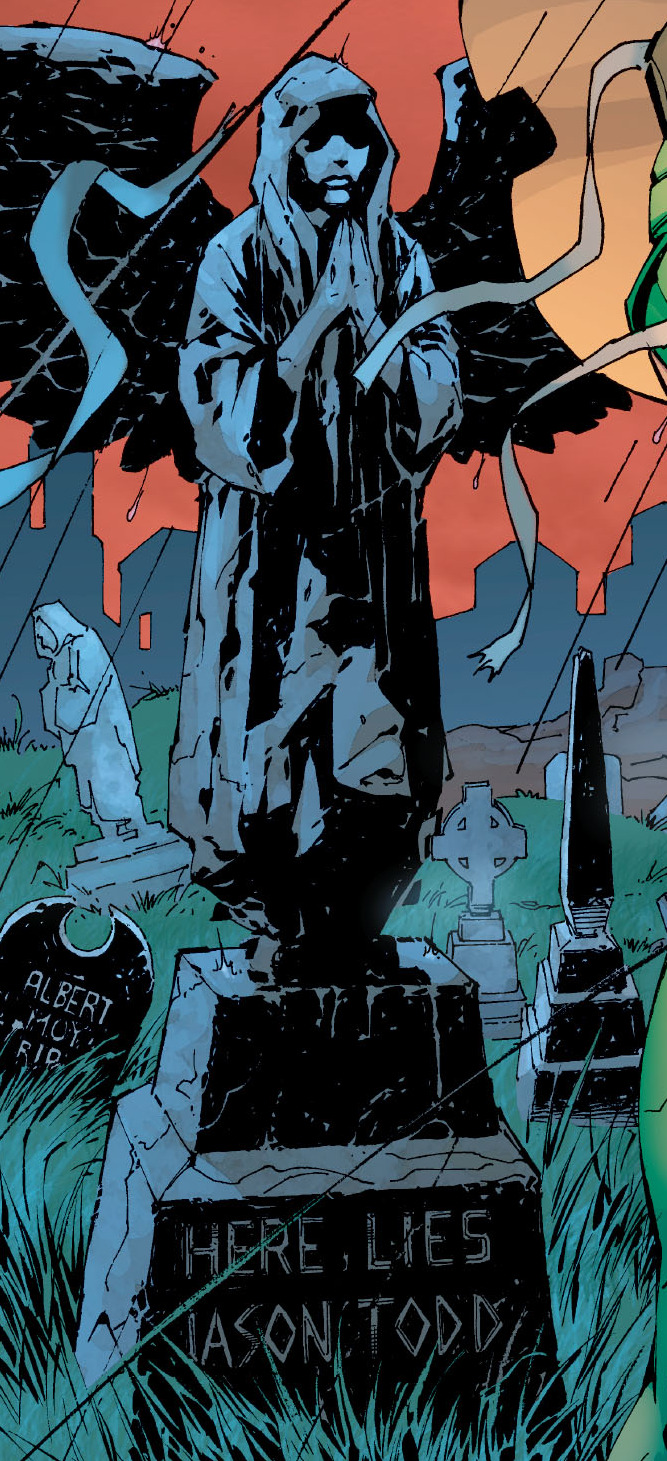
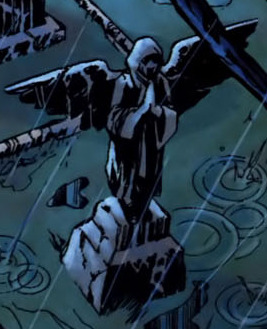
Jason's gravestone is consistently portrayed across multiple comics as an angel on a pedestal that reads 'HERE LIES JASON TODD'. The exception is The New Titans #55, where it's 'JASON TODD REST IN PEACE'
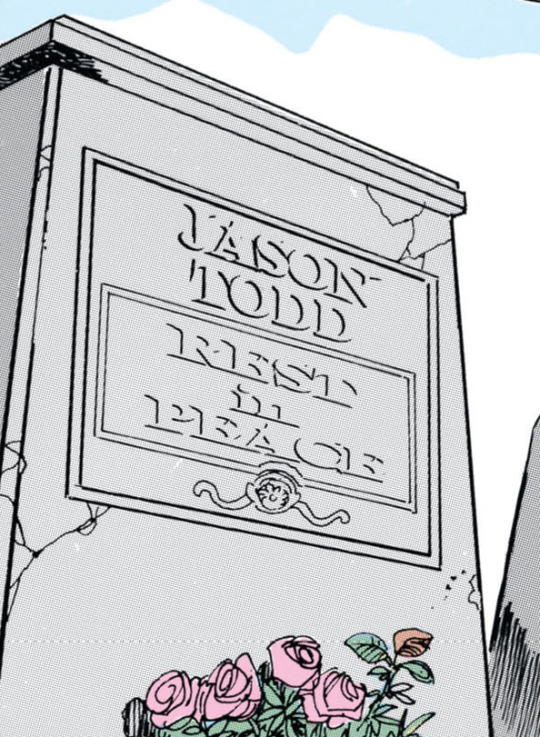
In Batman: Under the Hood #8, we learn that Jason's casket was designed by a man named Giovanni Locaso (who built the caskets for Bruce's parents.) Due to Locaso's arthritis, his son was the one to actually build Jason's coffin. (Lost Days implies that the LoA killed them both off, btw.)
Batman Annual 25 states Bruce placed 3 sensors within the coffin to test for tampering. (I could go on about inconsistencies regarding the presence of Jason's body in his grave (it's completely empty during Hush but Bruce digs up an empty coffin in Under the Hood, etc.), but since that's all post-resurrection I'll save it for another time.)
Sidenote: Jason's injuries
Deadman: Dead Again #2 notes that after the beating "half the bones in his body are broken."
Batman Annual 25 expands on these: Fractured skull (caused a brain bleed that put him in a coma, but this was after he dug himself out), flash burns, shattered sternum, collapsed lung, ~40 other fractures.
It is worth noting that for Batman Annual 25, this is after Superboy Prime's punch revived Jason, with the implication that these are the injuries he would have sustained if he hadn't died. It's also after he crawled out of the grave, walked 12.5 miles, and maybe got hit by a car, so some may have been sustained afterwards (like the wood slivers in his fingers I didn't mention above.)
Jason's legacy (the memorial case)
This post summarizes the memorial case much better than I can ever hope to. I'd like to highlight these panels from Batman (1940) #432:
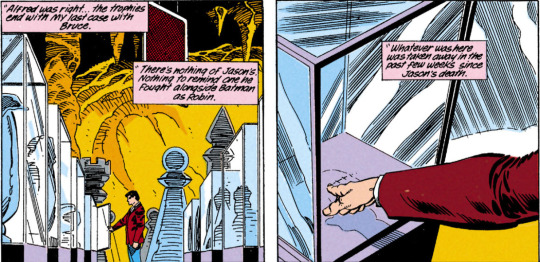
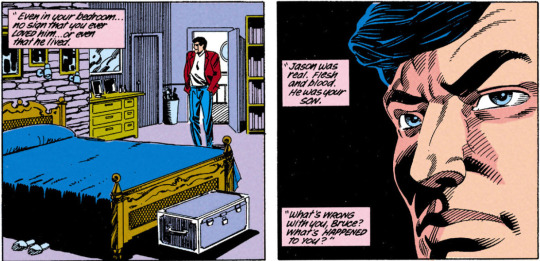
Bruce's initial reaction is to hide all evidence Jason ever existed.
We also have this panel from Batman (1940) #638, which is among a dream sequence/flashback/hallucination thing so its veracity is a little unclear.

'Alfred was the one who put up the memorial case against Bruce's will' panels are all from post-new 52 so I am ignoring them.
In The New Titans #55, the Batcomputer is linked to the Titan's computer (by Danny Chase). Within the Batcomputer, Jason's whereabouts are marked as Unknown. It takes Dick inputting Bruce's password to see that Jason's actually deceased. This is part of a pattern of obscuring Jason's death.
That fucking Joker diplomatic immunity arc
I hate this part of the comic and I refuse to reread it and refresh myself on the details. However. Things that are worth noting:
The extent of Bruce's investigation is to trick Joker into confirming that he did kill Robin. Again, no mention of Sheila's betrayal here.
Superman did not physically stop Bruce from killing the Joker at any point, and after Joker's attempted gassing and successful bombing of the UN, did let Bruce go after the Joker with the intent of killing him
The point of Bruce's attempted murder in that arc is entirely moot given the number of opportunities for Joker murder & the number of times Bruce has revived the Joker since.
46 notes
·
View notes
Text
How I would take the relationship between Batman and the Joker
This is just something that I've had in my veins for a while now and needed to get it out there so I wouldn't go CRAZY.
Howdy Doody!~
For a long time, I've been trying to figure out what would be an interesting direction for Batman and the Joker's relationship. One of the directions that I like the most is for Batman to finally kill the Joker.
Now, I know DC would never go for this because the Joker is one of their main cash cows. But I think what it could end up being is a spiritual successor to Knightfall. Where instead of Batman being broken physically and partially mentally, I think his killing the Joker would break him spiritually and shake him to his very core regarding why he became a hero in the first place.
There are countless ways that it could go down. But if I were to write the story, I think I would have the Joker trap Batman in some sort of labyrinth underground where he's completely cut off from the rest of the family. Joker would obviously put Batman through the wringer, torturing him and forcing him to go through deadly trials and tribulations. Overall, standard stuff when it comes to both of them. However, while Batman is trapped, the Joker plays him videos and footage of Gotham being destroyed, forcing Batman to watch as he destroys his city, kills his family, and ruins everything while he's still trapped.
It pushes Batman to his breaking point as he sees countless people being murdered, butchered, and torn apart. And it's all to the sound of Joker's constant mocking as he blames Batman for everything since he never decided to finish things and just kill him. At the same time, he's also throwing him through death trap after death trap before Batman finally gets to him.
From there, it's the standard beat down. However, this time, it's different. It isn't Batman fighting the Joker anymore; it's the man, Bruce Wayne, who's beating the clown prince of crime to death. And in a moment of pure and utter hate on Bruce's part, he finally does it. He kills the Joker. For me personally, I never see him doing it with a gun since he's so opposed to guns. But when he does it, Bruce finally manages to escape, only to find that Gotham is fine.
Turns out that all the footage he showed Batman was fake and that the Joker finally managed to get Batman to kill him without even having to kill anyone.
From there, word began to spread rather quickly that Batman killed the Joker, and it completely changed the dynamic between Batman and his villains. They're all now more cautious around him since it's been proven that if pushed far enough, Batman IS capable of killing. But for the most part, the entire world celebrates along with most of the hero community. However, for Batman himself, he hates it, he hates it all.
He hates that he's being celebrated for breaking his one rule. He hates that he's now one of the world's most beloved heroes for finally killing the Joker. He hates how no government or law enforcement official wants to bring him in. Most of all, he hates how good he feels afterward, like he can finally breathe easy and not have to worry about the clown prince of crime. And so, for a time, he hangs up his cowl and retires. He sees himself as tainted after taking a life, even if that life was the Joker's. But through his support system, people like Superman, Nightwing, and even Jason help Batman see that he can still be a hero even if he broke his one and only rule.
It takes time, of course. When he puts the cowl back on, he drifts between being too brutal and being too soft. He's scared that he'll end up killing again since he's done it once before, but at the same time, he doesn't want another Joker. But after a while, he finds his right footing and becomes a brighter hero. Not on the same level as someone like Superman or Nightwing, but for the first time in almost 30 years of crime fighting, he has hope that his mission will finally come to an end.
From here, he fights other villains, with perhaps someone like Bane stepping up to the mantle to become Batman's greatest foe now that Joker is out of the way. But for the most part, things return to some form of normalcy. Even then, the death of the Joker still weighs heavily on Batman's mind, but not as much as before.
But life goes on. Villains come and go. Gotham sees destruction come its way time and time again. However, one day, via some villain, whether it'd be in a Justice League book or a Batman title, Batman ends up in Hell. And who's there to greet him at those Hellish gates? Well, it's none other than the Joker.
Turns out that, after everything the Joker had done throughout his time as a villain, he's earned himself a special spot in the underworld as one of, if not THE most evil human being out there.
But for Batman, he now has to traverse Hell and find a way out while Joker tags along and tries to make his journey all the more painful as he taunts him about the fact that he finally managed to make him break his one rule. By the end of it all, Batman manages to escape Hell after managing to trick the Devil himself. In response, the Devil then revives the Joker as a demon whose sole purpose is to torment Batman.
However, unlike before, the Joker can't die since he'll just be resurrected, thanks to the Devil. This allows Batman to be more brutal than ever with the Joker; whether it'd be chopping him up into tiny pieces or burying him alive on the moon, there really isn't a limit to what Batman will do. But every once in a while, the Joker comes back, and Batman has to stop him once again. Although, thanks to the Joker now being part demon, he's able to pull more tricks that push Batman further than ever before.
Just off the top of my head, I see Joker maybe possessing people Batman cares about, creating new strains of Joker toxin that transform people into horrifying laughing monsters, and maybe even shapeshifting into new forms so that he can become an ally to Batman, only to stab him in the back.
To add onto this, Batman would ONLY get that brutal with the Joker since he can now take it.
I don't know if any of this makes sense or if it's any good. If anything, at the very least, I think it'd make a good Elseworld story, but beyond that, I'll leave it up to you.
#batman#batfam#bruce wayne#the joker#Cross posted on reddit#just some thoughts#just some rambles#dont take this too seriously#dc#dc universe#dcu#detective comics#nightwing#first post#first real post#dick grayson#superman#clark kent#red hood#jason todd#bane#bat family
36 notes
·
View notes
Text
We Live in a Family Planning Clinic DC Preliminary Poll


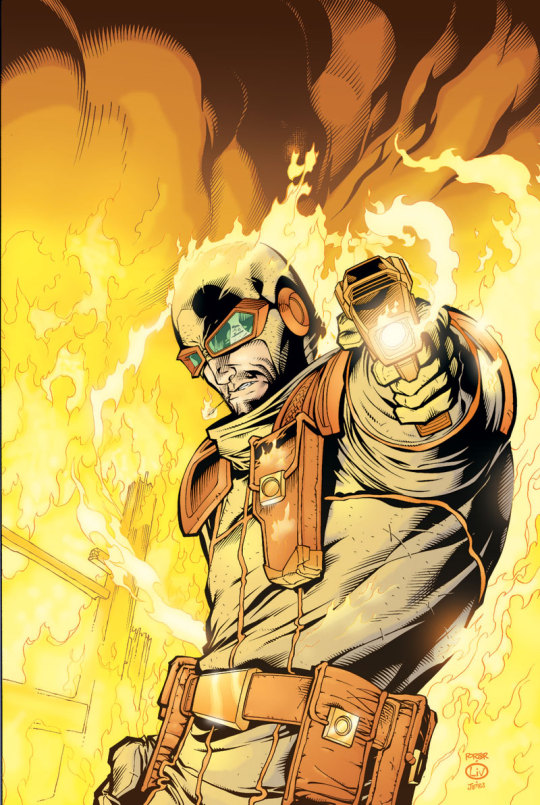
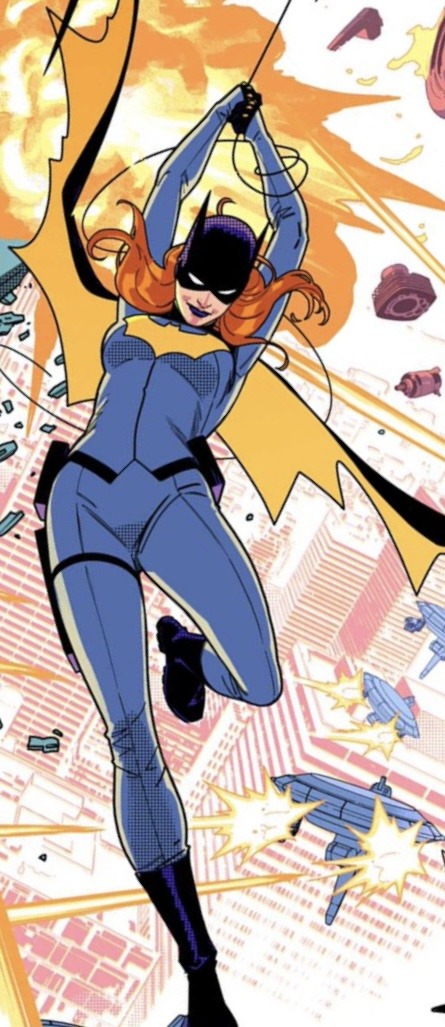
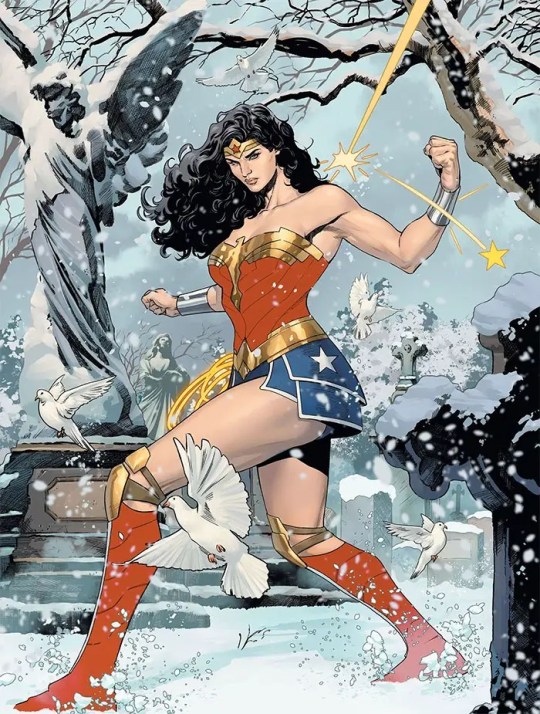
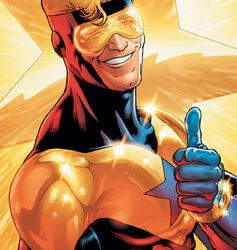

PROPAGANDA UNDER THE CUT:
The Joker: we live in a society which means we have to take the collective responsibility as a society and abort this miscreant from society. for the good of the society we live in. society.
Selina Kyle: just. no. no. she would abort
Mick Rory: Had a one night stand with an alien that resulted in the unexpected implantation of 48 eggs into his head. The main villain of the season helps him give birth/lay the eggs through the nose (horrible scene). Then the villain tries to blow up the eggs to distract the heroes. Yes this is a real plot no it was not fun I wish he aborted those thangs so I didn't have to watch the nose canal birth scene. Anyways having a human kid was hard enough for him how is he supposed to raise 48 alien babies
Barbara Gordon: He’s known her since she was a kid, so the whole Bruce/Barbara relationship is just gross and wouldn’t happen. He’s more of a father figure (and she literally dated his adopted son). Very out of character for both of them IMO.
Diana Prince: The author who made her have a kid is a man who didn't read any of WW's existing comics, made her daughter not for WW or her daughter herself but so the kids of Superman and Batman would have a Wonder Woman-lite they could babysit (her hero name is literally Trinity. Nothing about her or her mom in this story was about her or her mom) and also the author worked for the CIA. Fed alert. She would not, there have been comics about how she would not, and she already had relationships with children that she's trained and been close with that offer infinitely more wisdom in regards to her character than the industry plant of a baby she was given. She would not!!
Booster Gold: If he carried rip hunter this is going to make an extremely messy time paradox and I wanna see it happen
Bruce Wayne: He has too many kids already goddamn
#abortion tournament#abort that thing tournament#abortion#dcu#dc comics#dc#tournament poll#tumblr tournament#character tournament#tumblr competition#tumblr polls#poll bracket#polls#the joker#selina kyle#catwoman#mick rory#barbara gordon#batgirl#diana prince#diana of themyscira#wonder woman#booster gold#bruce wayne#batman#live poll
23 notes
·
View notes
Note
Hi! Big BIG fan of your Au’s, especially the Cairon one with my boi Tim.
I had a question: So we all know little Timmy was basically a stalker to the bats in the comics. Would he have still have done that in this AU? And do you think he ever ran into any of the nicer rogues? (We know what he does with scarecrow 💀)
Like, does Pamela show him different plants that have medicinal purposes?
Or Selina teaching him how to fight since he’s closer to her build than Batman’s?
(Tried to break it up so it wasn’t a wall of text 😅)
-In the Carrion AU, Tim started to stalk Batman and Robin right after he killed his parents. While he did spend most of his time studying toxicology and medicine, he also had more than enough free time to trail after the shadowy duo.
-Tim never encountered any super villains while he crept the streets of Gotham, however he would stumble into a few thugs occasionally. But each encounter would end the same, with Tim scampering away unharmed, while leaving his attacker waling in agony from a single needle.
-When Jason was killed *horrifically* by the Joker, Tim saw how much worse Bruce had gotten, and decided to help him by kidnapping Scarecrow. Learning the formula for the Fear toxin was also a sweet bonus, so in Tim eyes, he was getting a two for one special. He just hadn't expected Bruce to find him so quickly.
-Tim relationship with Poison Ivy was quite bad in the beginning. While Tim found Ivy's plants fascinating, Tim was an outright murderous monster in Ivy's eyes. Ivy valued plant life WAY more than human life, having no qualms about murdering someone over a wilted fern. So when she saw Tim causally rip her flowers apart and stuff their husks into his little bags, she FREAKED.
-WAY later on though they start to mutual respect each other. Tim tires to not kill the plants he collects from Ivy, and while he usually fails ((Tim has a black thumb)), Ivy appreciates the effort. They also both like to talk about toxicology and hold each other's opinions on such matters in high regards.
-As for Tim and Selina, well, Tim is kinda intimated by Selina, lol. She confuses the shit out of him and he doesn't know how to react to her. Tim a really good actor when he needs to be ((He freaks out Jason when he does it so well)) but with her, he's not sure how to act. So he avoids her. ((The same could be said for Wonder Woman, Tim just doesn't know how to handle motherly kindness))
344 notes
·
View notes
Note
hi! i'm one of those insane people who got into dc via seeing tumblr posts and going "huh these tropes seem like they are tailor made to get me obsessed" but was too intimidated by the volume of comics, and instead read the wikipedia pages of like 20 characters and dove right into fanfiction after. but i've been finding myself getting more and more frustrated with fanfics that are of the "i ignore canon entirely" variety and more and more curious about aspects of canon that are only brushed upon in fanfic. i kinda want to get into the comics but the amount is just. overwhelming. i don't really know where to start, both in regards to the timeline and where to actually find the comics to read. can i ask you for recommendations? if you don't have the time or inclination, no pressure, just delete this ask XD. thank you!
Hi! I'm glad you asked! I've had this ask sitting in my box for a little while because I've been working on redoing a Batfamily comics reading guide I made for my sister back in 2019 to get her into reading comics (it worked). Here is the reading guide, which is currently complete up to the No Man's Land section:
There's a lot of info in the guide to get you started (especially regarding your second point of where to actually find the comics to read), so I'll just address your first point (the timeline) here under the cut by providing an extended summary of events. There are spoilers ahead, but it's a useful read if you're the kind of person who likes to see the big picture before delving in. Warning: it's long!
The Timeline
(Most of the comics mentioned below have been bolded in the reading guide, so should be easy to find and read.)
Batman and Batfamily comics are old. Batman and Robin have both been around for over 80 years. Does this mean you need to read every comic since 1940? Absolutely not! For comic book reasons, there have been several mainstream continuities throughout the years, one after the other, but the best place to start is directly after the universe-rebooting event called Crisis on Infinite Earths in 1986, which established a new continuity known as Post-Crisis. Don't try to read that comic, just trust that it happened. You don't have to read every single one of the comics listed here, especially if you already know some context from fandom (like who's who), but these are the ones most important to the Batfamily mythos.
Origin and early years
Start your Batman reading journey with Batman: Year One, which documents the origin and first year of Batman, establishes his working relationship with Jim Gordon and introduces Selina Kyle (Catwoman). There are many stories capturing Batman's earliest years, the best of which are Batman: The Man Who Laughs (where he meets the Joker for the first time), Batman: The Long Halloween and its sequel Batman: Dark Victory.
Dick as Robin
Dick Grayson, a young acrobat, is introduced in Batman: Dark Victory when Haly's Circus comes to Gotham and his parents fall to their deaths before his (and Bruce's) eyes during their trapeze act, and he comes into his own as the first Robin in the superb one-shot Batman Chronicles: The Gauntlet. You should also read Batman: Ego for an excellent dissection of both Bruce and Batman. Other high quality Dick!Robin stories that flesh out this period and establish Bruce and Dick's relationship are Robin: Year One, Batman: Grimm (Batman: Legends of the Dark Knight #149-153) and Year One: Batman/Scarecrow. Also a good read around this time are the three Halloween stories by Jeph Loeb and Tim Sale (who created The Long Halloween and Dark Victory) collected in Batman: Haunted Knight. Lastly, a natural companion to Robin: Year One is Batgirl: Year One, starring Barbara Gordon, Jim's daughter-slash-adopted-niece.
Jason as Robin
Bit of a timeskip here. By now, Dick's been Robin for six years or so (sources vary), and Jason Todd is introduced in Batman (1940) #408-409 and faces Two-Face in #410-411. There are some fun Jason stories in Detective Comics (1937) #569-574. To see what Dick's up to at this time, read Nightwing: Year One, and also check out Batman #416 for an alternate story of how Dick and Jason meet.
A new Gotham vigilante, Huntress (Helena Bertinelli) is introduced right around here in Huntress: Year One, and Barbara Gordon (who by now has retired from being Batgirl) is shot by the Joker and left paralysed from the waist down in Batman: The Killing Joke. A good Jason!Robin story that slots in here is Batman: The Cult, before the tension between Bruce and Jason is raised in Batman #425-426. Finally, Jason's life and short-lived career as Robin are permanently ended by the Joker in Batman: A Death in the Family.
Aftermath
Bruce is straight up not having a good time right now. He's mourning his kid, the Joker is still at large, he's sans both a Robin and a Batgirl, and he's accused of treason in the character study comic Batman: Blind Justice (Detective Comics #598-600). Sometime later, Dick Grayson (who is sort of estranged from Bruce and has been hanging out with his Titans friends for years) returns to Gotham in the fantastic Batman: Year Three (Batman #436-439), which retells Dick's origin (with some contradictions to other stories listed here, because that's just the nature of comics) and deals with Dick's parents' killer, Tony Zucco, possibly getting parole. Look out for a cute cameo in this one, but don't worry if you miss it – it'll come up again.
Noticing Batman's increased brutality in the wake of Robin's death, a precocious thirteen-year-old named Tim Drake bursts into the narrative when he hunts down Dick at Haly's Circus in the seminal Batman: A Lonely Place of Dying. Batman: Dark Knight, Dark City (Batman #452-454) is a good solo Batman story from around this period, and Batman: Rite of Passage (Detective Comics #618-621) and Batman: Identity Crisis (Batman #455-457) are defining stories for Tim's pre-Robin period as he explores who he is and who he wants to be. (Specifically, Tim's mother is killed and his father is left paralysed.)
Tim as Robin
(Note: Tim is Robin up until Damian is, but I've split Tim's Robin tenure into multiple sections so that it's easier to follow.)
Now that Tim has officially taken up the mantle, Bruce sends him to train in Paris, where he makes enemies of his own and chooses the bo staff for his weapon in the 1991 Robin miniseries. Around this time, Barbara Gordon reinvents herself as Oracle in Oracle: Year One (The Batman Chronicles #5). Tim debuts as Robin with Batman in Gotham in Batman #465, works cases with Bruce in stories like Batman: Shadow Box (Batman #467-469), and even tackles the Joker when Batman is out of town in Robin II: The Joker's Wild.
Other good stories from this period are Batman: Electric City (Detective Comics #644-646), a character study of Tim's relationship with his dad in Batman #480, and a Batfamily teamup and Nightwing cameo in Batman: The Last Arkham (Batman: Shadow of the Bat #1-4). Stephanie Brown dubs herself the Spoiler to spoil the plans of her father, third-rate villain Cluemaster, in Detective Comics #647-649, and Huntress returns with her unorthodox methods in Detective Comics #652-653.
Next up, the sprawling epic that is the Knightfall Saga. Jean-Paul Valley, a graduate student with a family legacy causing him to be beholden to a lifetime of conditioning known as "the System", debuts in Batman: Sword of Azrael. Batman, who has been overworking himself due to increasing pressures from all sides, finds himself increasingly worn out in the stories collected in Batman: Prelude to Knightfall. (Around this time, Robin also forges an unlikely friendship with Huntress in Robin III: Cry of the Huntress.)
In Batman: Knightfall, a huge Arkham Asylum breakout pushes Batman to his limits, and when he finally returns home, mentally and physically depleted, he finds a new enemy waiting to destroy him. It's not pretty. While Bruce recovers, he appoints Jean-Paul Valley to be Batman to Tim's Robin in Batman: Knightquest. Unfortunately, with the System still active, Tim finds himself increasingly sidelined and Jim Gordon breaks ties with this new, inappropriately ruthless Batman. A lot of things happen, but Bruce eventually returns (and so does Nightwing, yay!) in Batman: KnightsEnd.
Right after KnightsEnd but before the next story, there's a DC-wide event called Zero Hour, in which the universe is destroyed and remade. From a Doylist perspective, this is an opportunity for DC to smooth out some oddities with their Post-Crisis timeline and eliminate any plot elements they were dissatisfied with. Among other things, the murderer of Bruce's parents, who had previously been established as a random mugger named Joe Chill, is retconned to be unconfirmed (naturally, this changed later). You don't have to read the main Zero Hour comic, which is a five-issue limited series numbered in reverse order, but there are interesting crossover issues in the various Batfamily comics that are ongoing at this time, including Tim!Robin solving a case with Dick!Robin in Robin (1993) #10. The main reason I mention Zero Hour is because it explains why there are key differences between early Post-Crisis comics like most of Jason's run and post-Zero Hour comics like Nightwing: Year One. The answer is retconning, and it'll come up again and again. Such is the nature of trying to maintain longevity and internal consistency for comics that never end.
Okay, back to the main events! In what is my favourite comic of all time, Bruce rights wrongs by asking Dick to temporarily be Batman instead of Jean-Paul (yay!), and Dick and Tim grow close as Batman and Robin and as honorary brothers before Dick and Bruce finally see eye to eye in Batman: Prodigal. When Bruce is ready to be Batman again, he dons a new, darker suit (which is very close to the suit in the Tim Burton movies that were popular at the time) in Batman: Troika. Alfred, who voluntarily left Bruce's employ in Knightquest, is persuaded to return to Gotham by his best friend, none other than Dick Grayson, in Nightwing: Alfred's Return. Later, Dick does some soul-searching of his own (and gains a new costume!) in the 1995 Nightwing miniseries, and three concurrent stories in Batman: Shadow of the Bat #46-47, Batman #527-528 and Detective Comics #693-694 lay the groundwork for the dramatic next stage of Gotham history.
No Man's Land
What's up next for Gotham? It's a plague! Dubbed the Apocalypse Virus and otherwise known as the Clench, this plague ravages Gotham in the Batfamily crossover Batman: Contagion, which is followed by a resurgence in Batman: Legacy. It's dramatic, it's whumpy, it's mesmerising and it's pretty great.
By this point, you'll be familiar with the regular cast of characters and can read more of their solo comics at your leisure. There's Batman for Bruce and Detective Comics and Batman: Shadow of the Bat for higher chances of him teaming up with others. Tim's solo comic, Robin (1993), has been going since Knightfall, and Dick's excellent long-running comic Nightwing (1996) begins here. Read Robin for Tim's teenage adventures (skateboarding, making friends in school), family ups and downs (his dad is mercurial, but at least he has a cool stepmother, Dana) and love life (he starts dating Steph) and read Nightwing for Dick striking out on his own in the neighbouring city of Blüdhaven, where he eventually joins the police academy to fight crime from a different angle. (There's also the Azrael comic, which may appeal if you find yourself liking Jean-Paul Valley, but as I haven't read much of it, I make no promises about its quality.)
Continuing the notable Batfamily crossover events, Nightwing has a dalliance with Huntress in Nightwing/Huntress, and a massive earthquake devastates Gotham in Batman: Cataclysm. The consequences of this spin into Batman: Aftershock, Batman: Road to No Man's Land and the sprawling, ambitious epic that is Batman: No Man's Land, in which Gotham is declared no longer part of the United States. Within this year of danger, chaos and political limbo, we are introduced to a silent young woman, daughter of the assassin David Cain. With Barbara's blessing, she comes to live at Oracle's base (the Clock Tower) and becomes the second Batgirl. (Also during this period, Steph gives birth to a baby from a former boyfriend, and Tim – in disguise – gets himself stuck in No Man's Land to help her. It's complicated.)
New Gotham
This, along with the previous section, is one of my favourite periods in Batfamily comics. Many of the solo comics just mentioned are at their peak in terms of storytelling, characterisation and plot development, and several more excellent series begin here, including the family-focused Batman: Gotham Knights and the first ever perpetual Batgirl series for the new Batgirl, who would come to be known as Cassandra Cain. Both series are well worth reading!
Batman: Evolution (Detective Comics #742-750) touches on the fallout of the No Man's Land and rebuilding "New Gotham", and Bruce unwillingly gains a personal bodyguard named Sasha Bordeaux in Batman: A Walk in the Park (Detective Comics #751-752), which of course complicates his nocturnal activities as Batman. Soon after, Jim Gordon is shot in Batman: Offcer Down, and (unrelatedly) Dick and Barbara, who have been having off-the-chart levels of UST for years, finally call their flirting what it is: dating. Also at this time, Bruce has been rekindling his relationship with his pre-No Man's Land girlfriend, Vesper Fairchild.
In Joker: Last Laugh, the Joker decides to go out with a bang in when he finds out he's apparently suffering from terminal brain cancer. The theme of family is explored in Batman: Gotham Knights, with Bruce offering to adopt Dick (at long last) in Batman: Matatoa (Batman: Gotham Knights #16-17). And then a secret threatens to tear the Batfamily apart when Bruce is accused of murdering Vesper Fairchild in Bruce Wayne: Murderer?, eventually prompting him to drop the Bruce Wayne identity completely (this made a lot of people very angry and has been widely regarded as a bad move) and become Batman full-time as he goes on the run in Bruce Wayne: Fugitive. Eventually the murder is solved and the murderer is accounted for, and these two stories are probably my favourite Batfamily crossovers ever. They're so juicy and get to the heart of everything I love about each member!
The excellent Bruce & Dick comic Batman/Nightwing: Bloodborne fits somewhere around here, as well as Jeph Loeb and Jim Lee's beautifully drawn and critically acclaimed Batman: Hush, which touches on Bruce's on-again, off-again relationship with Selina Kyle. Around this time in the Nightwing comic, Dick's life has been on a downward spiral for months because of a multitude of factors, including losing his girlfriend, his day job, his circus family, his apartment building and more. This is also where the villains Blockbuster and Tarantula are prominent.
Over in Robin, Tim's father discovers that Tim is Robin and demands that Tim give up the mantle, which he reluctantly does. This results in Bruce offering the job to Steph, driving a wedge between her and Tim. Her tenure as Robin is short-lived for several reasons, and all this leads into the mega-crossover Batman: War Games, in which a massive gang war breaks out in Gotham and Tim's sort-of girlfriend, Darla Aquista, is killed. By the time the dust settles, Steph is (believed) dead, Dick temporarily gives up his Nightwing mantle to work for the mafia (yup), Barbara and Jim leave Gotham and Tim's father is murdered in the DC-wide crossover Identity Crisis, resulting in Tim and Cassandra relocating to Blüdhaven, effectively sealing the breakup of the Batfamily. War Games is followed up by Batman: War Crimes, which is included here for timeline reasons and not much else.
Batman's pretty much all alone in Gotham again, right? Time for somebody else to return. Someone who's been haunting the narrative all these years. Yup, in the wake of the gang war, when rival mob bosses are vying to wrest control of the city, a new crime lord emerges in Batman: Under the Hood: the Red Hood, who turns out to be Jason Todd, back from the dead, and no longer a boy in a yellow cape but instead a ruthless, hypocritical murderer with a chip on his shoulder and no qualms about stabbing Batman's allies. (For more about Jason between his death and return to Gotham, read Red Hood: Lost Days.)
Lastly, there's a DC-wide event called Infinite Crisis, which shakes up the whole DC Universe and leads to Batman, Nightwing and Robin taking a trip around the world for a whole year. (Infinite Crisis also kills off Tim's best friend, Conner Kent/Superboy. Tim's really going through it at this time, poor guy.) Oh, and Blüdhaven is razed by a bomb during Infinite Crisis as well. Yup.
One Year Later
(Disclaimer: it's been a while since I read this period and this one beyond it.) After a year away from Gotham, Batman, Nightwing and Robin return, and Bruce adopts Tim (at long last) in Batman: Face the Face. I'm sure this happy-ish period is going to last, right? Well, the very next story is Batman and Son, in which Bruce learns he has a young son named Damian, who is the child of Talia, daughter of Ra's al Ghul (Batman's currently dead, formerly immortal nemesis of League of Assassins fame). Damian and Tim instantly don't hit it off – rather, Tim is friendly until the bratty and hostile Damian reveals himself to be a murderer and attempts to kill Tim. Of course, Bruce doesn't take kindly to this, and Damian eventually goes back to live with his mother.
Also, during the year the others were away, Cassandra was brainwashed and became evil because of Deathstroke and DC Editorial (this made a lot of people very angry and has been widely regarded as a bad move). Later, Bruce adopts her in the otherwise mediocre 2008 Batgirl miniseries. There's a lot of complicated stuff around this time, such as Steph being retconned as Alive All Along and returning to Gotham in Robin: Violent Tendencies (Robin #170-175, Robin/Spoiler Special), Dick relocating to New York and having a mediocre run in Nightwing, Tim having a new black and red Robin suit to honour Superboy's death, Tim struggling mentally and trying to clone Conner(!) and revive Steph, his dad and Conner, Ra's al Ghul coming back from the dead (again) and trying to use a younger body (Damian or Tim) to stabilise his form in Batman: The Resurrection of Ra's al Ghul, and Bruce tackling the criminal organisation known as the Black Glove in Grant Morrison's Batman R.I.P.
DC-wide events once again have consequences (hooray) in Final Crisis, in which Batman dies. Is he dead for good? Well, this is comic book land, so probably not, but in the meantime, the public can't know that either Batman or Bruce Wayne have died. Hush masquerades as Bruce Wayne (long story) and the Robins battle it out for the mantle in Batman: Battle for the Cowl. Despite Tim's pleas, Dick refuses to become Batman, resulting in an imposter Batman who shoots to kill taking centre stage. This impostor turns out to be Jason, who fights first Tim, then Dick, the latter of whom defeats him. Against Bruce's wishes in his will, Dick becomes the new Batman, and Damian becomes Robin at his side.
Damian as Robin
This new status quo, also known as Batman: Reborn, marks the start of several new series, including Red Robin and Batgirl (2009). Red Robin stars Tim as a deeply unreliable narrator in his new title of Red Robin in his grief-fuelled efforts to gather evidence that Bruce is not dead, while Batgirl follows Stephanie Brown as she becomes the third Batgirl under Oracle's tutelage, the pair of them working out of the Batcave.
Dick, Damian and Alfred have relocated to the penthouse in Wayne Tower and operate out of the underground bunker. Dick and Damian's rocky partnership develops into an unlikely yet compelling and heartfelt bond in Batman and Robin (2009) as they tackle a plethora of villains, including Professor Pyg and Red Hood (again). And where is Cassandra Cain? Sidelined again! She gave up Batgirl for Steph, on Bruce's request, and now goes by Black Bat, though we don't see much of her for Editorial Reasons (sigh).
This being comics, Bruce doesn't stay dead for long, and with both Tim and Dick (separately) discovering evidence that Bruce is not dead, just lost in time (yup), they work together to bring him back alive. I don't pretend to remember all the intricacies of how this works, but you can read about Bruce's journey in Batman: Time and the Batman (Batman #700-703), Batman: The Return of Bruce Wayne and Bruce Wayne: The Road Home. It's long and complex and honestly reading Grant Morrison's writing tends to do my head in.
There are a handful more stories after Bruce's return, including some hugs and heartfelt reunions (yes, really!) and the excellent Batman: The Black Mirror story starring Dick as Batman, but even though this is a really cool new status quo with a bunch of interesting implications going forward, the universe doesn't really stabilise, because we're up to 2011 by now, and the world gets hit by another DC-wide crossover called Flashpoint. Except, this is the biggest one since Crisis on Infinite Earths that I mentioned way back at the beginning, and so everything gets rebooted. EVERYTHING.
Batman and Detective Comics and other long-running comics are cancelled and their number restarted from #1, and many series are cancelled and just never reinstated. This new universe, known as the New 52, sets a new status quo that worked in some aspects but not so much in others. Many changes from the universe we just came from are just jumps that happen without explanation, such as Dick's return to being Nightwing (except now he's red instead of blue), Jason being an anti-hero with a bat on his chest instead of a villain, everyone being younger and closer in age, Steph and Cass being minimised and essentially replaced, and many more frustrating retcons that are confusing and/or illogical. But hey, at least the new Batman and Robin comic (starring Bruce and Damian) and Scott Snyder's Batman run (introducing the Court of Owls) are good! Note: the New 52 was soft rebooted in 2016 to become the current continuity, known at its inception as DC Rebirth, which reintroduced many Post-Crisis elements to mainstream canon.
Duke Thomas? He wasn't introduced until the New 52. Harper and Cullen Row? New 52. Tim being bisexual and dating Bernard? Rebirth, though Bernard was inspired by a very minor character of the same name from Tim's long-running Robin comic. Forever Evil, Spyral and the Grayson comic? New 52. Kate Kane (Batwoman)? She appeared during Batman: Reborn, but she wasn't established as Bruce's cousin until the New 52. Many such cases.
And so, right before Flashpoint is where the Post-Crisis on Infinite Earths continuity ends after twenty-five years, with Bruce as Batman and running a worldwide initiative called Batman Incorporated in Batman Incorporated (2010), Dick as Batman in Gotham, Damian as Robin, Tim as Red Robin, Steph as Batgirl, Cassandra as Black Bat, Barbara as Oracle and Jason as Red Hood (and full villain, not reformed in any way, shape or form). In this continuity, Bruce adopted (in order) Jason, Dick, Tim and Cassandra, and of course Damian is his biological son. It's my favourite continuity, and I hope you enjoy it too.
...And I apologise belatedly for the wall of text.
42 notes
·
View notes
Text
So let me just recap briefly the history of the first joker and the first riddler. The first riddler was the guy from the telltale games. The one played by robin atkin downes who died at the end of the first chapter of the game. And the first joker is alfred stryker, some weird mutant who became a crime lord and mafioso whilst also becoming a champion of the downtrodden. Together, the riddler and the joker became enemies of the Court of Owls. But they both vanished decades ago. Nobody ever learned where they went. And they both only resurface now, just in time to strike back against the Court of Owls.
The Riddler reappears first, and he ends up dying just the same way he did in the telltale games. Except here he manages to inspire young forensic scientist Edward Nygma shortly before he does, which will inevitably lead to the birth of a second Riddler. But all that's important for right now is that the first riddler dies, and the original joker blames the Court of Owls for his death when he finds out about it. That's all that's important for this recap of my storyline.
When the original Joker breaks out, he ends up infiltrating the Court of Owls. Meanwhile, Batman is busy dealing with Doctor Phosphorus (who I forgot to mention earlier, but who was the third core component to the riddler and joker's old triad of crime). By the time Batman has stopped Doctor Phosphorus from taking revenge on the families of Hamilton Hill, Carmine Falcone and Bruce Wayne, the original joker has already learned everything he needed to learn in regards to the Court of Owls and their history. More of this is covered in my original note on him, so I don't want to discuss it again now.
But to cut to the chase, Batman finds the original joker and the court of owls headquarters just as everything's gone to hell. Alfred Stryker has been uncovered by the Court, but he's already rigged their parliament building to explode. Batman manages to save a small handful of court members, but it's too late for most of them. The whole building explodes in a fiery ball of chemically induced destruction, and the Court of Owls is no more. Their whole membership is dead. Alfred Stryker is dead, turned into dust alongside all the members of the Court. It's all over, but now Gotham is broken and in desperate need of rebuilding.
So we make a time skip to around eight months later. That's around when batman first meets Dick Grayson and takes him in as Robin. The organized crime scene in Gotham is virtually nonexistent now, so all the criminals this dynamic duo faces end up being costumed supervillians of some variety or another. The second Joker, the second Riddler, Two-Face, The Penguin, Catwoman, etc. It's not peak silver age style storytelling, and this is where i'm gonna leave this story.
I can't be bothered to write any more stuff to bridge the rest of the gap until we catch up with pre crisis 1985/1986 time, so i'm leaving this task to somebody else now. If you want to continue my worldbuilding exercise in futility, go right ahead. Talk about Ra's Al Ghul, and the birth of the second Robin (Jason Todd), and how Killer Croc killed Jason's parents, and how Nocturna became Jason's adoptive mother. But i'm done. This is too much for any one man to bear. I think I exhausted myself writing all this at school today. And also, I feel like writing all this took away from my ability to read my book as effectively at school. So yeah. I'm done. Someone else needs to finish what i've started, because i give up.
PS: The first joker is responsible for Ethan Bennett becoming one of many supervillians known as clayface. I forgot to mention that, but it's something that does happen here. I can't not have Ethan Bennett show up in my Batman story. He's similar to Harvey Dent, but he's a distinct character all his own. I feel like it's only fair I feature both of them here.
#i officially give up#this was a waste of time#it took away from time i could've been reading at school#it was a disaster#sigh...#batman#bruce wayne#robin#dick grayson#jason todd#court of owls#the court of owls#the joker#the riddler#doctor phosphorus#batman telltale#edward nygma#john doe telltale#that's the second joker#the second joker is john doe#the second riddler is edward nygma#dc#dc headcanon#dc headcanons#dc universe#dcu#nocturna#jason todd robin#robin jason todd#jaybin
36 notes
·
View notes